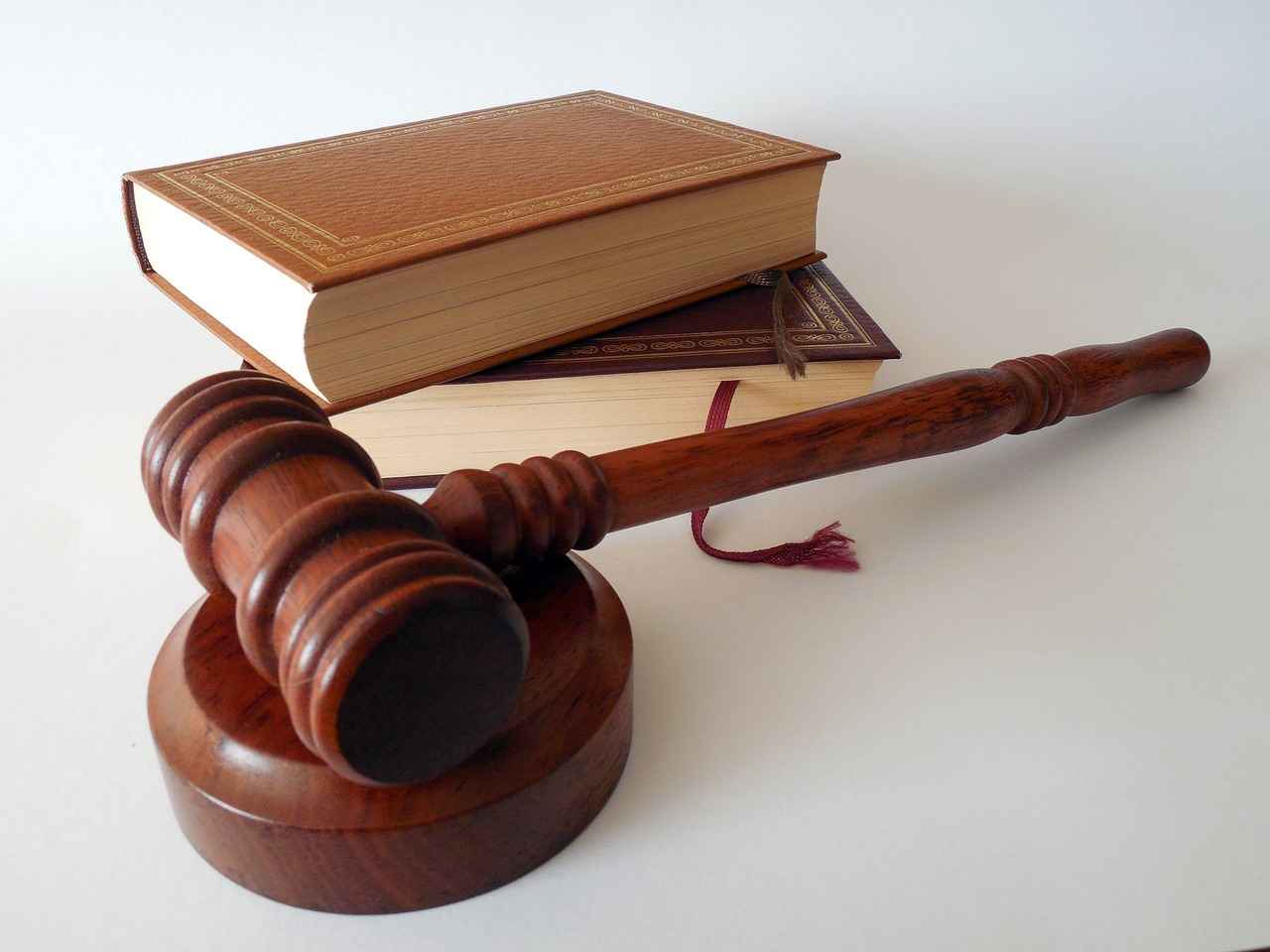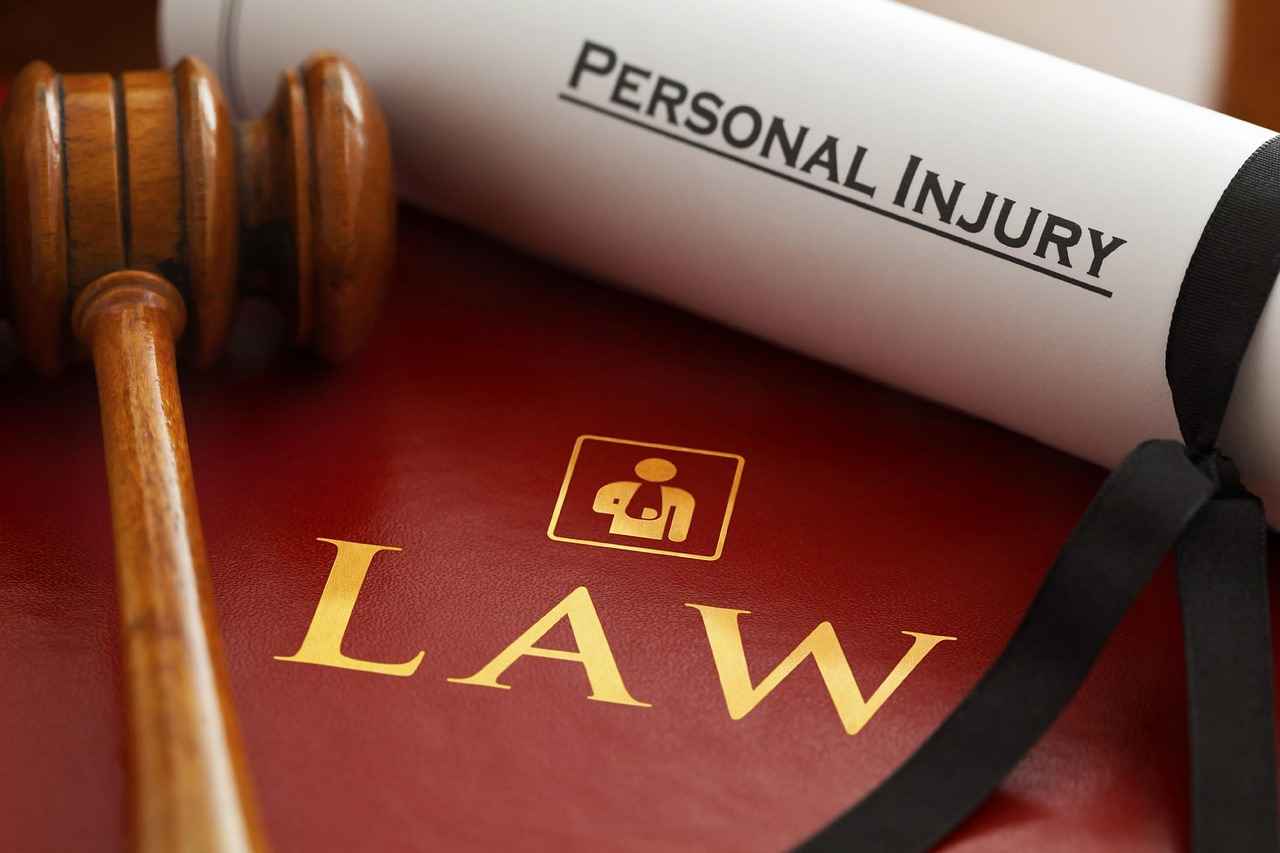This article provides a comprehensive guide on identifying qualified lawyers for various legal cases in Laredo, Texas, focusing on practical tips and expert insights.
Finding the right attorney can be a daunting task, especially in a city like Laredo, Texas, where legal needs can vary significantly. This guide aims to equip you with the knowledge necessary to identify qualified lawyers for different legal cases, ensuring you make informed decisions.
In Laredo, various legal cases arise, including personal injury, family law, and criminal defense. Understanding these categories is essential for finding the right attorney for your specific needs.
Personal injury cases often stem from accidents or negligence. Finding an attorney who specializes in this field can significantly impact the outcome of your claim for damages. Look for attorneys with a proven track record in similar cases, as their experience can greatly influence the results.
- Check for a strong history of settlements and verdicts.
- Read client testimonials and reviews.
- Ensure they have experience with cases similar to yours.
Prepare specific questions regarding their experience, fees, and approach to handling your case. This will help you gauge their suitability and commitment to your case.
Medical malpractice cases require attorneys with specific expertise in healthcare law. Understanding the nuances of these cases is crucial for effective representation.
- Seek attorneys with medical malpractice certifications.
- Look for a history of successful verdicts.
- Familiarity with medical terminology and litigation processes.
Be cautious of lawyers who lack experience in medical malpractice or those who promise guaranteed outcomes. Transparency and realistic expectations are key indicators of a trustworthy attorney.
Breach of contract cases can be complex, often requiring specialized legal knowledge. Business owners in Laredo must choose attorneys familiar with contract law and commercial disputes.
- Look for attorneys who have successfully handled breach of contract cases.
- Evaluate their background in business law and negotiation skills.
Understanding fee structures is essential. Some lawyers charge hourly rates, while others may work on a contingency basis, depending on the case’s nature.
Landlord-tenant disputes are common in Laredo, often involving issues like eviction or lease violations. An attorney experienced in real estate law can provide essential guidance.
- Seek attorneys with a focus on landlord-tenant law.
- Ensure they understand local regulations and have experience in mediation and litigation.
Familiarize yourself with tenant and landlord rights in Texas. An attorney can help you understand these rights and represent you effectively in disputes.
Defamation (libel and slander) cases can be challenging to prove. Finding an attorney who specializes in defamation law is crucial for protecting your reputation.
- Look for attorneys with a solid background in media law.
- Experience in defamation cases is essential.
Be aware of the challenges in proving defamation, such as demonstrating actual malice or false statements. A knowledgeable attorney can help navigate these complexities.
Employment disputes can arise from wrongful termination, discrimination, or harassment. An attorney specializing in labor law is essential for navigating these sensitive issues.
- Search for attorneys who specialize in employment law.
- Look for a proven track record in handling cases similar to yours.
Familiarize yourself with employment laws in Texas, including worker rights and employer obligations. This knowledge can empower you during consultations with potential attorneys.
Product liability cases involve injuries caused by defective products. Finding an attorney with experience in product liability law is essential for successful claims.
- Look for attorneys who have handled product liability cases.
- Ensure familiarity with consumer protection laws.
Be aware of potential defenses manufacturers may use, such as product misuse. An experienced attorney can help counter these arguments effectively.
Wrongful death cases are emotionally charged and require skilled representation. An attorney with experience in these sensitive matters can help families seek justice.
- Look for attorneys who demonstrate empathy and understanding of your situation.
- Their ability to handle emotional aspects while pursuing legal action is vital.
Familiarize yourself with potential compensation types, including medical expenses and lost income. An experienced attorney can provide guidance on what to expect.
Class action lawsuits allow individuals to band together against larger entities. Finding an attorney experienced in class actions is essential for successful litigation.
- Seek attorneys with a history of handling class action cases.
- Their expertise in complex litigation will be crucial for navigating the legal process.
Familiarize yourself with the class action process, including certification and settlement. An informed attorney can guide you through each stage effectively.
Criminal defense cases require specialized knowledge of criminal law. An experienced attorney can provide critical representation in serious matters such as drug offenses and theft.
- Look for attorneys with a strong background in criminal defense.
- A successful track record can significantly impact your case’s outcome.
Familiarize yourself with your rights during an arrest. An attorney can help protect these rights and ensure you receive fair treatment throughout the legal process.
Family law encompasses various issues, including divorce, child custody, and adoption. Finding a compassionate attorney who specializes in family law is essential for sensitive matters.
- Seek attorneys who have experience in family law.
- Look for a reputation for handling cases with empathy and professionalism.
Familiarize yourself with the divorce process, including property division and custody arrangements. An informed attorney can guide you through each step effectively.
Immigration cases often involve complex regulations and legal procedures. Finding an attorney with expertise in immigration law is crucial for successful outcomes.
- Look for attorneys specializing in immigration law.
- A proven track record in handling cases similar to yours is essential.
Familiarize yourself with the immigration processes relevant to your case. An experienced attorney can provide insight into timelines and required documentation.
Bankruptcy cases provide individuals and businesses a fresh start. An attorney with experience in bankruptcy law can help navigate the complexities of filing.
- Search for attorneys who specialize in bankruptcy.
- Ensure they have a solid understanding of both Chapter 7 and Chapter 13 filings.
Familiarize yourself with the bankruptcy process, including credit counseling and discharge of debts. An informed attorney can help you prepare and understand your options.
Finding the right attorney in Laredo, Texas, involves understanding your legal needs and researching qualified professionals. By following the guidelines outlined in this article, you can make informed decisions for your legal representation.

Understanding Common Legal Cases in Laredo
In Laredo, Texas, individuals often find themselves navigating a complex legal landscape. Various legal cases arise, each requiring specialized knowledge and expertise. Understanding these categories is essential for finding the right attorney to address your specific needs effectively.
The most common types of legal cases in Laredo include personal injury, which often involves accidents resulting from negligence, and family law, encompassing issues like divorce and child custody. Additionally, criminal defense cases are prevalent, where individuals seek representation for charges ranging from drug offenses to theft.
To find the most qualified attorney for your legal situation, consider the following categories:
- Personal Injury: Cases often stem from accidents, medical negligence, or product defects. Look for attorneys with proven success in obtaining compensation for clients.
- Family Law: Issues like divorce and custody disputes require attorneys with a compassionate approach and a strong understanding of Texas family law.
- Criminal Defense: If facing criminal charges, seek attorneys specializing in criminal law who have a track record of favorable outcomes in similar cases.
When searching for an attorney, consider their experience, specialization, and client reviews. It’s crucial to ask about their approach to handling cases and whether they offer a free consultation. This initial meeting can provide insight into their communication style and commitment to your case.
Moreover, be wary of red flags, such as attorneys who make unrealistic promises or lack transparency about their fees. A reputable attorney will provide a clear breakdown of their costs and be upfront about potential outcomes.
In summary, understanding the common legal cases in Laredo and knowing how to find the right attorney can significantly impact your legal journey. Take the time to research and consult with multiple lawyers to ensure you choose the best fit for your needs.

Personal Injury Cases: What You Need to Know
Personal injury cases are a significant area of law that often arise from accidents or negligence. These cases can encompass a wide range of incidents, from car accidents to slip and fall accidents, and even medical malpractice. The primary goal in a personal injury claim is to seek compensation for damages incurred as a result of someone else’s actions or inaction.
Finding an attorney who specializes in personal injury law can greatly influence the outcome of your claim. A qualified attorney will have the necessary knowledge and experience to navigate the complexities of personal injury cases, ensuring that your rights are protected and that you receive the compensation you deserve.
When searching for a personal injury lawyer, consider the following essential factors:
- Track Record: Look for attorneys with a proven history of successfully handling personal injury cases similar to yours. Their experience can provide insight into their ability to achieve favorable outcomes.
- Client Reviews: Online reviews and testimonials can offer valuable information about an attorney’s reputation and client satisfaction. Websites like Avvo and Martindale-Hubbell can be excellent resources for this information.
- Specialization: Ensure that the attorney you choose specializes in personal injury law. This specialization is crucial, as personal injury law has unique nuances that require specific expertise.
- Initial Consultation: Most personal injury lawyers offer free initial consultations. Use this opportunity to assess their communication style, approach to your case, and overall professionalism.
During your initial consultation, be prepared to ask specific questions to gauge the attorney’s suitability for your case:
- What is your experience with personal injury cases?
- What is your fee structure? Do you work on a contingency basis?
- How do you plan to approach my case?
- What is your success rate in obtaining settlements or verdicts for clients?
Additionally, be wary of red flags when hiring a personal injury attorney:
- Lack of Experience: Avoid attorneys who do not have a solid background in personal injury law. Their inexperience could jeopardize your case.
- Unrealistic Promises: Be cautious of lawyers who guarantee specific outcomes. The legal process can be unpredictable, and no attorney can assure you of success.
- Poor Communication: If an attorney is difficult to reach or does not respond promptly to your inquiries, it may indicate a lack of commitment to your case.
In summary, personal injury cases can be complex and challenging, but with the right legal representation, you can navigate the process more effectively. By focusing on an attorney’s experience, specialization, and client feedback, you can find a qualified professional who will advocate for your rights and help you achieve a just outcome.
How to Identify a Personal Injury Lawyer
When it comes to personal injury cases, selecting the right lawyer can be the difference between a successful outcome and a frustrating experience. Personal injury law encompasses a wide range of incidents, including car accidents, slip and falls, and workplace injuries. To ensure you have the best representation, consider the following guidelines when identifying a personal injury lawyer.
Start by looking for attorneys who specialize in personal injury law. This specialization is crucial as it indicates that the lawyer is familiar with the nuances of the field. A good way to gauge their expertise is by examining their track record in handling similar cases. You can often find this information on their firm’s website or legal directories.
Online reviews and testimonials can provide valuable insights into a lawyer’s success rate and client satisfaction. Websites like Avvo, Yelp, and Google Reviews can help you gather feedback from previous clients. Look for patterns in the reviews—consistent praise for communication skills, responsiveness, and successful case outcomes are good signs.
Legal directories such as Martindale-Hubbell and FindLaw can be excellent resources for identifying qualified personal injury lawyers. These directories often include peer reviews and ratings that can help you assess an attorney’s reputation in the legal community. Additionally, check with your local or state bar association for any disciplinary actions against the attorney.
During your initial consultation, pay attention to how the lawyer communicates. A good personal injury attorney should be willing to explain the legal process in terms you can understand. They should also be open to answering your questions and addressing your concerns. Compatibility is key; you want to feel comfortable discussing personal details about your case.
Most personal injury lawyers work on a contingency fee basis, meaning they only get paid if you win your case. However, it’s essential to clarify the fee structure upfront. Some lawyers may charge additional costs for filing fees, expert witnesses, or other expenses. Ensure you understand the total cost and any potential out-of-pocket expenses before signing an agreement.
Be cautious of any lawyer who makes unrealistic promises or guarantees about the outcome of your case. The legal process can be unpredictable, and no attorney can assure you of a specific result. Additionally, avoid lawyers who seem more interested in settling quickly rather than pursuing the best outcome for you. A dedicated personal injury lawyer will prioritize your needs and fight for your rights.
Word of mouth can be one of the most reliable ways to find a personal injury lawyer. Ask friends, family, or colleagues if they have any recommendations based on their experiences. Personal referrals can often lead you to trustworthy attorneys who have a proven track record of success.
In conclusion, identifying the right personal injury lawyer requires thorough research and careful consideration. By focusing on specialization, utilizing online resources, assessing communication, and being aware of red flags, you can find an attorney who will effectively represent your interests. Remember, the right lawyer can significantly impact the outcome of your personal injury case, so take the time to choose wisely.
Questions to Ask During Initial Consultations
When seeking legal representation, the initial consultation is a critical step in determining whether an attorney is the right fit for your case. To make the most of this opportunity, it is essential to prepare a list of specific questions that will provide insight into the lawyer’s experience, fees, and approach to handling your case. This preparation not only helps you gauge their suitability but also demonstrates your seriousness and engagement in the process.
1. What is your experience with cases like mine?
Understanding an attorney’s background is crucial. Ask about their experience with cases similar to yours. Inquire about the number of cases they have handled in your specific area of law and their success rates. This will help you assess their expertise and ability to navigate the complexities of your situation.
2. How do you charge for your services?
Legal fees can vary significantly from one attorney to another. It is vital to understand their fee structure. Some attorneys charge hourly rates, while others may work on a contingency basis, meaning they only get paid if you win your case. Be sure to ask about any additional costs that may arise, such as court fees, administrative costs, or expenses related to expert witnesses.
3. What is your approach to handling my case?
Every attorney has a unique approach to case management. Ask them to outline how they plan to handle your case. This includes their strategies for gathering evidence, communicating with you, and negotiating with the opposing party. Understanding their methodology will give you confidence in their ability to advocate for your interests.
4. How will you keep me updated on my case?
Effective communication is key in any attorney-client relationship. Inquire about how often you can expect updates and through what means (e.g., phone calls, emails, or in-person meetings). A good attorney will prioritize keeping you informed about the progress of your case and any developments that may arise.
5. Can you provide references or testimonials from past clients?
References can provide valuable insight into an attorney’s reputation and client satisfaction. Ask for testimonials or references from previous clients who had similar cases. This can help you gauge their professionalism, communication skills, and overall effectiveness.
6. What are the potential outcomes of my case?
While no attorney can guarantee specific results, a knowledgeable lawyer should be able to discuss the potential outcomes based on their experience with similar cases. They should also be able to outline the risks involved and the factors that could influence the outcome.
7. What happens if my case goes to trial?
Understanding the trial process is essential, especially if there is a possibility that your case may not settle out of court. Ask the attorney about their trial experience and how they prepare for litigation. This will give you insight into their readiness to represent you fully in court if necessary.
8. Are there any red flags I should be aware of?
During your consultation, pay attention to any inconsistencies or evasive answers. Be cautious of attorneys who make unrealistic promises or guarantees regarding the outcome of your case. Transparency is crucial, and a reputable attorney will provide honest assessments of your situation.
9. What is your availability?
Understanding an attorney’s availability is vital, especially if your case requires immediate attention. Inquire about their current caseload and how much time they can dedicate to your case. This will help you assess whether they can provide the level of attention your case deserves.
10. What are the next steps if I decide to hire you?
Finally, ask about the next steps in the process if you choose to move forward with hiring the attorney. This includes any paperwork that needs to be completed and how soon they can begin working on your case. Knowing what to expect will help you feel more comfortable and prepared.
By asking these targeted questions during your initial consultation, you can gain valuable insights into the attorney’s qualifications and approach. This will empower you to make an informed decision about your legal representation, ensuring that you find a lawyer who is not only qualified but also committed to your case.

Medical Malpractice: Finding Specialized Representation
Medical malpractice cases are among the most complex and emotionally charged types of legal disputes. They involve situations where healthcare professionals fail to provide the standard of care expected in their field, leading to patient harm. To navigate these intricate cases effectively, it is essential to seek attorneys with specific expertise in healthcare law and a proven track record in medical malpractice litigation.
When searching for a qualified medical malpractice attorney, consider the following strategies:
- Research Credentials: Look for attorneys who have specialized training in medical malpractice law. Certifications from recognized legal organizations can indicate a lawyer’s commitment to this area of law.
- Evaluate Experience: Seek attorneys with extensive experience handling medical malpractice cases. A lawyer who has successfully represented clients in similar situations will have a deeper understanding of the nuances involved.
- Check Reviews and Testimonials: Online reviews and client testimonials can provide insight into an attorney’s reputation and success rate. Platforms like Avvo and Martindale-Hubbell can be valuable resources for this information.
- Assess Communication Skills: A good attorney should be able to explain complex medical and legal concepts in a way that is easy to understand. Schedule initial consultations to gauge their communication style.
- Understand Fee Structures: Medical malpractice cases can be expensive to litigate. Many attorneys work on a contingency fee basis, meaning they only get paid if you win your case. Ensure you understand their fee structure and any additional costs involved.
While searching for a medical malpractice attorney, be aware of potential red flags:
- Lack of Experience: Avoid attorneys who claim to handle a broad range of legal issues but lack specific experience in medical malpractice cases.
- Guarantees of Outcomes: Be cautious of lawyers who promise guaranteed results. The nature of legal cases is inherently unpredictable, and a reputable attorney will provide realistic expectations.
- Poor Communication: If an attorney is difficult to reach or unresponsive during initial consultations, it may be a sign of future communication issues.
In addition to these tips, consider seeking referrals from trusted sources, such as friends, family, or healthcare professionals. They may have insights or recommendations based on their experiences. Remember, the right attorney can make a significant difference in the outcome of your medical malpractice case, so take the time to conduct thorough research and choose wisely.
Credentials to Look For in a Medical Malpractice Attorney
When facing the complexities of medical malpractice cases, it is crucial to have a qualified attorney by your side. The right legal representation can significantly influence the outcome of your case. Here are some essential credentials to look for when searching for a medical malpractice attorney:
- Specialized Certifications: Look for attorneys who possess certifications in medical malpractice law. These credentials indicate that the attorney has undergone additional training and has a deeper understanding of the nuances involved in medical malpractice cases.
- Proven Track Record: An attorney’s history of successful verdicts is a vital indicator of their capability. Seek out lawyers who have a strong track record of winning cases similar to yours. This history demonstrates their ability to navigate the complexities of medical malpractice litigation effectively.
- Familiarity with Medical Terminology: Medical malpractice cases often involve intricate medical concepts and terminology. An attorney well-versed in these terms can articulate your case more effectively and engage with medical experts during the litigation process.
- Experience in Litigation: It is essential to choose an attorney who has substantial litigation experience, particularly in medical malpractice cases. Their familiarity with courtroom procedures, evidence presentation, and jury dynamics can be invaluable in achieving a favorable outcome.
- Client Testimonials and Reviews: Researching client feedback can provide insight into an attorney’s reputation and effectiveness. Look for reviews that highlight their communication skills, professionalism, and success in handling similar cases.
- Membership in Professional Organizations: Membership in organizations such as the American Association for Justice (AAJ) or state-specific trial lawyer associations can indicate a commitment to staying updated on the latest developments in medical malpractice law.
- Initial Consultation: Most reputable medical malpractice attorneys offer free initial consultations. Use this opportunity to gauge their communication style, approach to your case, and overall compatibility with your needs.
Finding the right medical malpractice attorney can be a daunting task. However, by prioritizing these credentials, you can increase your chances of securing a competent and trustworthy legal representative who will advocate for your rights and interests.
Red Flags When Hiring a Medical Malpractice Lawyer
When seeking legal representation for medical malpractice cases, it is crucial to exercise caution. The legal landscape can be overwhelming, and not all lawyers possess the necessary expertise or integrity. Here are some red flags to watch out for when hiring a medical malpractice lawyer:
- Lack of Specialized Experience: Medical malpractice law is a niche area that requires specific knowledge of healthcare practices and regulations. Be wary of attorneys who do not have a proven track record in this field. Look for lawyers who specialize in medical malpractice and have successfully handled similar cases.
- Promises of Guaranteed Outcomes: Any lawyer who guarantees a specific outcome should raise alarm bells. The legal process is inherently unpredictable, and reputable attorneys will focus on providing realistic expectations rather than making unrealistic promises. A trustworthy attorney will discuss potential outcomes based on the specifics of your case without making guarantees.
- High Pressure Tactics: If a lawyer pressures you to sign a contract or move forward with your case without giving you adequate time to think, this is a significant red flag. A good attorney will respect your need to consider your options and will provide you with the information needed to make an informed decision.
- Unclear Fee Structures: Transparency regarding fees is essential. Be cautious of attorneys who are vague about their fee structures or who do not provide a written agreement outlining their fees and payment plans. Look for lawyers who offer clear explanations of their billing practices, including any potential additional costs.
- Negative Reviews or Complaints: Research the attorney’s reputation through online reviews, testimonials, and any complaints filed with the state bar association. While every attorney may have a few negative reviews, a pattern of complaints or consistent negative feedback should raise concerns about their competence and professionalism.
- Inadequate Communication: Effective communication is vital in any attorney-client relationship. If a lawyer is difficult to reach, does not respond promptly to your inquiries, or fails to keep you updated on the progress of your case, it may indicate a lack of commitment to your representation.
- High Turnover Rates: If you notice that the attorney has a high turnover rate of staff or associates, it may reflect poorly on their practice. Consistency in a law firm is often a sign of a healthy work environment, which can translate to better service for clients.
- Overemphasis on Settlements: While many medical malpractice cases are settled out of court, an attorney who seems overly focused on settling quickly may not be advocating for your best interests. A good lawyer will assess the merits of your case and advise you on whether to settle or pursue litigation, depending on what is most beneficial for you.
In conclusion, finding the right medical malpractice lawyer is crucial for the success of your case. By being aware of these red flags, you can better navigate the selection process and choose an attorney who is not only qualified but also trustworthy and committed to your case.

Breach of Contract Cases: Legal Guidance for Businesses
Breach of contract cases are a significant concern for business owners in Laredo and across the United States. These cases arise when one party fails to fulfill their obligations as outlined in a legal agreement. The complexities involved in these disputes often require specialized legal knowledge and experience. Thus, understanding how to find the right attorney is crucial for effective resolution.
When searching for a lawyer to handle breach of contract cases, it is essential to consider their background in contract law and commercial disputes. Here are some practical tips to help you identify qualified attorneys:
- Experience in Business Law: Look for attorneys who have a proven track record in handling breach of contract cases. Their experience in business law will be invaluable in navigating the complexities of your case.
- Specialization: Choose lawyers who specialize in commercial litigation or contract disputes. Specialized attorneys will be more familiar with the nuances of the law and the best strategies for your situation.
- Negotiation Skills: Effective negotiation can lead to a favorable settlement without the need for a lengthy court battle. Assess the attorney’s ability to negotiate on your behalf.
In addition to experience and specialization, consider the following methods and platforms to find the right attorney:
- Online Legal Directories: Websites such as Avvo and FindLaw allow you to search for attorneys based on their practice area and location. These platforms often provide reviews and ratings from previous clients.
- Bar Association Referrals: Local or state bar associations can provide referrals to qualified attorneys. They often have resources to help you find lawyers with the right expertise.
- Networking: Reach out to other business owners or professionals in your industry for recommendations. Personal referrals can lead you to trustworthy attorneys.
When evaluating potential attorneys, it is vital to ask specific questions during initial consultations:
- What is your experience with breach of contract cases? This question will help you gauge their familiarity with similar cases.
- What is your fee structure? Understanding how they charge—whether hourly or on a contingency basis—will help you budget for legal expenses.
- What is your approach to resolving disputes? Their strategy will give you insight into how they plan to handle your case.
As you navigate the process of hiring an attorney, be aware of potential red flags:
- Lack of Experience: Be cautious of lawyers who do not have a strong background in breach of contract cases or business law.
- Unrealistic Promises: Avoid attorneys who guarantee outcomes. Legal cases can be unpredictable, and a trustworthy lawyer will provide realistic expectations.
- Poor Communication: If an attorney is difficult to reach or does not respond promptly, it may indicate a lack of commitment to your case.
In summary, finding the right attorney to handle breach of contract cases in Laredo requires careful consideration of their experience, specialization, and negotiation skills. By utilizing online resources, seeking referrals, and asking the right questions, business owners can ensure they are well-represented in legal matters. Understanding what to look for and what to avoid will ultimately lead to a more favorable resolution of disputes.
Finding a Business Litigation Attorney
When searching for a business litigation attorney in Laredo, Texas, or any major metropolitan area, it’s crucial to consider several factors that can significantly impact the outcome of your legal matters, particularly in breach of contract cases. A skilled attorney not only understands the intricacies of contract law but also possesses the negotiation skills necessary to resolve disputes effectively.
Start by seeking attorneys who have a successful track record in handling breach of contract cases. Their experience will provide you with insights into how similar cases have been resolved in the past. You can often find this information through:
- Online Reviews: Websites like Avvo, Martindale-Hubbell, and Google Reviews can provide client testimonials and ratings.
- Legal Directories: Use platforms like FindLaw or the American Bar Association’s directory to search for attorneys by specialty.
- Referrals: Ask for recommendations from business associates, friends, or family who have dealt with similar issues.
An attorney’s background in business law is essential. Look for professionals who have:
- Educational Credentials: A law degree with a focus on business or commercial law.
- Memberships: Active participation in legal associations such as the American Bar Association’s Business Law Section.
- Special Certifications: Consider attorneys with certifications in business litigation or commercial dispute resolution.
Negotiation is often where the best outcomes are achieved in breach of contract cases. An attorney who excels in negotiation can help you reach a settlement without the need for prolonged litigation. During your initial consultations, ask potential attorneys about their approach to negotiations:
- Past Negotiations: Inquire about specific instances where they successfully negotiated settlements.
- Strategies Used: Understanding their negotiation tactics can give you insight into their effectiveness.
Before hiring an attorney, it’s crucial to understand their fee structure. Some attorneys charge hourly rates, while others may work on a contingency basis, especially in cases where damages are sought. Be sure to clarify:
- Hourly vs. Contingency Fees: Understand how each fee structure works and which one applies to your case.
- Retainer Fees: Some attorneys may require an upfront retainer. Ensure you know how this will be applied to your overall costs.
While searching for a business litigation attorney, be wary of certain red flags that may indicate a lack of professionalism or competence:
- Unrealistic Promises: Be cautious of attorneys who guarantee specific outcomes or promise to win your case without discussing the complexities involved.
- Lack of Communication: If an attorney is unresponsive during the initial consultation, it may indicate future communication issues.
- Negative Reviews: While one bad review may not be a deal-breaker, a pattern of negative feedback should raise concerns.
By following these guidelines, you can find a qualified business litigation attorney who will advocate effectively for your interests in breach of contract cases. The right attorney can make a significant difference in the resolution of your legal disputes, ensuring that your rights are protected and your business interests are represented.
Evaluating Attorney Fees in Breach of Contract Cases
When dealing with breach of contract cases, understanding the financial implications is crucial. Attorney fees can vary significantly based on several factors, including the lawyer’s experience, the complexity of the case, and the fee structure they employ. This section will provide a comprehensive overview of how to evaluate attorney fees in breach of contract cases, ensuring you make an informed decision when selecting legal representation.
Attorneys typically operate on one of several fee structures. Knowing these can help you choose the right lawyer for your breach of contract case:
- Hourly Rates: Many lawyers charge by the hour, which can range from $150 to over $500, depending on their experience and location. This structure can be beneficial for straightforward cases but may become costly if the case drags on.
- Contingency Fees: In some cases, attorneys may work on a contingency basis, meaning they only get paid if you win. This is more common in personal injury cases but can apply to breach of contract cases if there is a significant potential for damages.
- Flat Fees: Some lawyers may offer a flat fee for specific services, providing predictability in costs. This is often the case for drafting contracts or simple consultations.
- Retainer Fees: Some attorneys require a retainer, an upfront payment that secures their services. This amount is then drawn upon as work is completed.
Several factors can influence the fees charged by attorneys in breach of contract cases:
- Experience and Reputation: More experienced attorneys typically charge higher fees due to their proven track record and expertise.
- Complexity of the Case: Cases involving intricate legal issues or substantial financial stakes may require more time and resources, leading to increased fees.
- Geographic Location: Legal fees can vary significantly by region. Major metropolitan areas often have higher rates due to the cost of living and demand for legal services.
When consulting with potential attorneys, it’s essential to ask the right questions to understand their fee structure fully:
- What is your hourly rate, and how do you bill for your time?
- Do you offer a flat fee for specific services?
- Can you provide an estimate of total costs for my case?
- Are there any additional costs I should be aware of, such as filing fees or administrative costs?
- What is your policy on retainer fees, and how will they be applied to my case?
While evaluating attorneys, be vigilant for certain warning signs that may indicate potential issues with their services:
- Lack of Transparency: If an attorney is unwilling to discuss their fees or provide a written agreement detailing costs, consider this a red flag.
- Unrealistic Promises: Be wary of lawyers who guarantee outcomes or suggest that your case will be quick and easy. Legal matters can be unpredictable.
- High Pressure Tactics: If an attorney pressures you to sign a contract or pay a retainer immediately, take a step back and reassess your options.
In conclusion, evaluating attorney fees in breach of contract cases is a critical step in selecting the right legal representation. By understanding the different fee structures, asking the right questions, and being aware of potential red flags, you can make a more informed decision that aligns with your financial situation and legal needs.

Landlord-Tenant Disputes: Navigating Legal Challenges
Landlord-tenant disputes are a frequent occurrence in Laredo, Texas, as well as in many other urban areas across the United States. These disputes often arise from various issues, including eviction processes, lease violations, and disagreements over property maintenance. Understanding the legal landscape surrounding these conflicts is crucial for both landlords and tenants to protect their rights and interests.
When faced with a landlord-tenant dispute, seeking the guidance of an attorney who specializes in real estate law can be invaluable. These legal professionals possess the expertise necessary to navigate the complexities of housing regulations and can provide essential advice tailored to your situation.
When searching for a real estate attorney, consider the following criteria:
- Experience: Look for attorneys with a proven track record in handling landlord-tenant disputes. Their familiarity with local laws and regulations will be beneficial.
- Specialization: Choose attorneys who focus specifically on landlord-tenant law, as they will have the most relevant knowledge and skills.
- Client Reviews: Check online reviews and testimonials to gauge client satisfaction and success rates.
Both landlords and tenants should familiarize themselves with their respective rights under Texas law. Here are some key points to consider:
- Tenant Rights: Tenants have the right to a safe and habitable living environment. They also have protections against unlawful eviction and discrimination.
- Landlord Rights: Landlords have the right to receive rent on time and to maintain their property. They can also initiate eviction proceedings under specific conditions.
Consulting with an attorney can help clarify these rights and ensure they are upheld in any legal dispute. An attorney can also assist in drafting or reviewing lease agreements to prevent future misunderstandings.
Several issues can lead to landlord-tenant disputes, including:
- Eviction: This is one of the most common disputes, often resulting from non-payment of rent or lease violations. Understanding the legal eviction process is essential for both parties.
- Security Deposits: Disagreements over the return of security deposits can lead to conflicts. Landlords must provide itemized lists of deductions, while tenants should know their rights regarding deposit returns.
- Repairs and Maintenance: Tenants may argue that landlords are neglecting necessary repairs, while landlords may contend that tenants are causing damage.
To find the most qualified attorney for your landlord-tenant dispute, consider the following steps:
- Referrals: Ask friends, family, or colleagues for recommendations. Personal experiences can lead you to trustworthy attorneys.
- Online Directories: Utilize legal directories such as Avvo or Martindale-Hubbell to search for attorneys with specific expertise in landlord-tenant law.
- Initial Consultations: Many attorneys offer free consultations. Use this opportunity to discuss your case and evaluate their approach and compatibility.
When hiring a real estate attorney, be wary of the following red flags:
- Lack of Communication: If an attorney is difficult to reach or does not respond promptly to inquiries, this may indicate future challenges in your case.
- Unclear Fee Structures: Ensure you understand how the attorney charges for services and avoid those who are vague about their fees.
- Overpromising Results: Be cautious of attorneys who guarantee outcomes. Legal cases can be unpredictable, and a good attorney will provide realistic expectations.
By taking the time to research and choose the right attorney, both landlords and tenants can navigate disputes effectively and work towards a resolution that protects their rights and interests. Remember, having a knowledgeable legal professional on your side can make a significant difference in the outcome of your case.
What to Look for in a Real Estate Attorney
When dealing with real estate matters, especially landlord-tenant disputes, it is crucial to have the right legal representation. Real estate law can be complex, and understanding local regulations is essential for effective legal support. Here are some key factors to consider when looking for a real estate attorney.
When seeking a real estate attorney, particularly for landlord-tenant issues, focus on the following attributes:
- Specialization in Landlord-Tenant Law: Choose attorneys who specialize specifically in landlord-tenant law. Their expertise will ensure they are well-versed in local regulations and can navigate the complexities of such cases.
- Experience in Mediation and Litigation: An attorney with experience in both mediation and litigation is invaluable. They should be able to negotiate settlements effectively while also being prepared to take your case to court if necessary.
- Local Knowledge: Attorneys familiar with the local laws and court systems can provide insights that may not be apparent to those practicing in other jurisdictions. Their understanding of local precedents can significantly impact your case.
- Strong Communication Skills: Effective communication is key in any legal matter. Look for attorneys who can explain complex legal terms in a way that is easy to understand and who keep you informed throughout the process.
- Positive Client Reviews: Research online reviews and testimonials. A lawyer with a strong reputation and positive feedback from previous clients can offer reassurance of their capabilities.
- Transparent Fee Structure: Understand how the attorney charges for their services. Some may work on a flat fee basis, while others may charge hourly. Ensure that you have a clear understanding of costs to avoid unexpected fees.
Moreover, consider scheduling an initial consultation with potential attorneys. This meeting can help you assess their understanding of your specific situation and their approach to handling your case. Prepare questions about their experience, strategies, and outcomes of similar cases. This will give you a better sense of their suitability for your needs.
In summary, finding the right real estate attorney for landlord-tenant disputes requires careful consideration of their specialization, experience, and local knowledge. By focusing on these factors, you can ensure that you have qualified representation that understands your rights and can effectively advocate on your behalf.
Understanding Your Rights as a Tenant or Landlord
Understanding your rights as a tenant or landlord in Texas is crucial for maintaining a fair and lawful rental relationship. The laws governing landlord-tenant interactions are designed to protect both parties, ensuring that rights are upheld and responsibilities are met. Whether you are a tenant seeking a safe and habitable living space or a landlord looking to manage your property effectively, knowing your rights can prevent disputes and foster a harmonious rental experience.
Tenant Rights in Texas
- Right to a Habitable Home: Tenants in Texas have the right to live in a property that meets basic health and safety standards. This includes functioning plumbing, heating, and electrical systems.
- Right to Privacy: Landlords must provide reasonable notice before entering a tenant’s unit, typically 24 hours, except in emergencies.
- Protection Against Retaliation: Tenants cannot be evicted or have their leases terminated as retaliation for exercising their legal rights, such as reporting unsafe living conditions.
- Right to Security Deposit: Tenants are entitled to the return of their security deposit within 30 days of lease termination, minus any legitimate deductions.
Landlord Rights in Texas
- Right to Collect Rent: Landlords have the right to receive rent as stipulated in the lease agreement. Failure to pay rent can lead to eviction proceedings.
- Right to Evict: If tenants violate lease terms or fail to pay rent, landlords have the right to initiate eviction proceedings through the court system.
- Right to Enter Property: Landlords can enter the rental property for necessary repairs or inspections, provided they give appropriate notice to the tenant.
- Right to Manage Property: Landlords can set rules and regulations regarding the use of the property, as long as they are not discriminatory or violate tenant rights.
Importance of Legal Representation
In disputes between landlords and tenants, legal representation can be invaluable. An experienced attorney can help you navigate the complexities of Texas rental laws, ensuring that your rights are protected. They can assist in understanding lease agreements, filing necessary legal documents, and representing you in court if needed.
When to Seek Legal Help
- If you are facing eviction or have been wrongfully evicted.
- If you believe your landlord is violating your rights or failing to maintain the property.
- If you are a landlord dealing with problematic tenants or disputes over lease terms.
Finding the Right Attorney
When searching for legal representation in landlord-tenant disputes, consider the following:
- Specialization: Look for attorneys who specialize in real estate or landlord-tenant law.
- Experience: Seek attorneys with a proven track record in handling similar cases.
- Reputation: Research reviews and testimonials from previous clients to gauge their effectiveness and client satisfaction.
- Consultation: Many attorneys offer free initial consultations. Use this opportunity to discuss your case and evaluate their approach.
In conclusion, understanding your rights as a tenant or landlord in Texas is vital for fostering a positive rental relationship. Whether you are facing disputes or seeking to enforce your rights, having a knowledgeable attorney by your side can make a significant difference in the outcome of your case.

Defamation Cases: Protecting Your Reputation
Defamation cases, encompassing both libel (written defamation) and slander (spoken defamation), can be particularly challenging and complex to navigate. These cases often revolve around allegations that false statements have caused harm to an individual’s reputation. In today’s digital age, where information spreads rapidly, protecting one’s reputation has become more crucial than ever. To effectively pursue a defamation claim, it is essential to understand the legal framework and the nuances involved in proving such cases.
One of the primary challenges in defamation cases is the burden of proof. The plaintiff must demonstrate that the statement in question was not only false but also made with actual malice or negligence. This means that the defendant either knew the statement was false or acted with a reckless disregard for the truth. Given these stringent requirements, it is imperative to enlist the help of an attorney who specializes in defamation law.
When searching for a qualified defamation attorney, consider the following key factors:
- Experience in Defamation Cases: Look for attorneys who have a proven track record in handling defamation cases. Their experience will be invaluable in navigating the complexities of your case.
- Understanding of Media Law: Defamation often intersects with media law, particularly when public figures are involved. An attorney well-versed in this area can provide critical insights.
- Strong Communication Skills: Effective communication is vital in legal proceedings. Choose an attorney who can articulate your case clearly and persuasively.
- Client Testimonials: Research reviews and testimonials from previous clients. Positive feedback can provide reassurance of the attorney’s competence and reliability.
Additionally, it is essential to be aware of common pitfalls in defamation cases. Many individuals underestimate the difficulty of proving their claims. Here are a few red flags to watch out for when hiring a defamation attorney:
- Guarantees of Success: Be wary of any attorney who promises guaranteed outcomes. The nature of defamation cases is inherently uncertain, and a reputable lawyer will provide a realistic assessment of your chances.
- Lack of Transparency: An attorney who is not forthcoming about their fees, processes, or potential challenges may not have your best interests at heart.
- Inexperience with Defamation Law: Avoid attorneys who lack specific experience in defamation cases, as they may not be familiar with the intricacies involved.
In major metropolitan areas such as New York City, Los Angeles, and Chicago, the legal landscape can be crowded and competitive. Here are some practical methods for finding the right defamation attorney in these bustling cities:
- Online Legal Directories: Utilize platforms like Avvo, FindLaw, or Justia to search for attorneys specializing in defamation law. These directories often provide ratings, reviews, and detailed profiles.
- Networking: Leverage your personal and professional networks for recommendations. Word-of-mouth referrals can lead you to trustworthy legal professionals.
- Consultations: Schedule initial consultations with potential attorneys. This allows you to discuss your case, ask questions, and assess their suitability for your needs.
Understanding your rights and the legal implications of defamation is crucial. If you believe you have been defamed, it is essential to act swiftly. Document any evidence of the defamatory statements, including screenshots, recordings, or witness accounts. This documentation will be vital in building your case.
In conclusion, defamation cases require a strategic approach and the expertise of a qualified attorney. By taking the time to research and find the right legal representation, you can effectively protect your reputation and pursue justice in a challenging legal landscape.
Choosing a Defamation Attorney: Key Considerations
Defamation cases can be particularly challenging due to their intricate nature and the high stakes involved. In the realm of legal representation, it is crucial to find an attorney who not only understands the nuances of defamation law but also possesses a strong background in media law. Here are some key considerations to keep in mind when selecting a defamation attorney.
- Experience in Defamation Cases: Seek attorneys who have a proven track record in handling defamation cases. Their experience will help them navigate the complexities involved, such as demonstrating the elements of defamation, including false statements, actual malice, and damages.
- Understanding of Media Law: An attorney with a solid foundation in media law will be well-versed in the First Amendment and its implications for defamation cases. This understanding is essential, as it can significantly affect the strategy and outcome of your case.
- Communication Skills: Effective communication is vital in legal proceedings. Choose an attorney who can articulate your case clearly and persuasively, both in written documents and during court appearances.
- Client Testimonials and Reviews: Research potential attorneys by looking for client reviews and testimonials. This feedback can provide insights into their success rates, professionalism, and overall client satisfaction.
- Fee Structure: Understand the attorney’s fee structure before committing. Some may charge hourly rates, while others may work on a contingency basis. Ensure that you are comfortable with the financial arrangement and that it aligns with your budget.
- Initial Consultation: Take advantage of the initial consultation to assess the attorney’s suitability. Prepare specific questions about their experience with defamation cases, their approach to your situation, and how they plan to handle your case.
- Red Flags to Avoid: Be cautious of attorneys who make unrealistic promises or guarantees regarding the outcome of your case. A reputable attorney will provide a realistic assessment based on their experience and the specifics of your situation.
In summary, selecting the right defamation attorney involves careful consideration of their experience, understanding of media law, communication skills, and client feedback. By following these guidelines, you can enhance your chances of finding a qualified legal professional who can effectively represent you in your defamation case.
Common Pitfalls in Defamation Cases
Defamation cases, encompassing both libel (written defamation) and slander (spoken defamation), can be particularly challenging to navigate. The legal hurdles involved in proving defamation require not only a deep understanding of the law but also an adeptness in presenting compelling evidence. Here, we will explore the most common pitfalls individuals face when pursuing defamation claims and how to effectively avoid them.
- Understanding Actual Malice: One of the most significant challenges in defamation cases is proving actual malice. This legal standard requires the plaintiff to demonstrate that the defendant acted with knowledge of the statement’s falsity or with reckless disregard for the truth. Many plaintiffs underestimate the burden of proof required to establish this level of intent, which can lead to frustration and dismissal of their claims.
- False Statements: A fundamental element of any defamation case is the necessity to prove that the statement in question is false. Individuals often mistakenly believe that a statement is defamatory simply because it is damaging to their reputation. However, if the statement is true, it is not considered defamation, regardless of its impact. Therefore, gathering evidence to establish the falsity of the statement is crucial.
- Public Figures vs. Private Individuals: The legal standards for defamation differ significantly between public figures and private individuals. Public figures must meet the higher standard of actual malice, while private individuals typically need only to prove negligence. Misunderstanding this distinction can lead to missteps in case strategy and expectations.
- Timing and Statute of Limitations: Each state has its own statute of limitations for filing defamation claims, which can range from one to three years. Delaying action can result in losing the right to seek legal recourse. It is essential to consult with an attorney promptly to ensure that you adhere to these time limits.
- Choosing the Right Legal Representation: Not all attorneys have the same level of experience or expertise in defamation law. Selecting a lawyer who specializes in this area is critical. Look for attorneys with a proven track record in handling defamation cases, as they will be more equipped to navigate the complexities involved.
- Public Statements and Social Media: In the age of social media, it is important to be cautious about statements made publicly. Anything shared online can be scrutinized and potentially used against you in a defamation case. Avoid making public comments about the case or the parties involved until your attorney advises otherwise.
- Settlement Considerations: Many defamation cases are settled out of court. While this may seem like a straightforward resolution, it is crucial to consider the implications of any settlement agreement. Ensure that any settlement terms are reviewed by your attorney to avoid inadvertently waiving your rights.
In conclusion, navigating the legal landscape of defamation requires a thorough understanding of the law, careful consideration of the facts, and strategic legal representation. By being aware of these common pitfalls and working closely with a knowledgeable attorney, individuals can better protect their reputations and pursue justice effectively.

Employment Disputes: Seeking Justice in the Workplace
Employment disputes are a significant concern for both employees and employers in the workplace. They can arise from a variety of issues, including wrongful termination, discrimination, and harassment. Navigating these sensitive matters requires the expertise of an attorney specializing in labor law. This article aims to provide valuable insights into finding the right legal representation for employment disputes, ensuring that your rights are protected and justice is sought.
Before seeking legal assistance, it is crucial to have a basic understanding of employment laws in your state. In Texas, for instance, laws protect employees from unfair treatment based on race, gender, age, disability, and other characteristics. Familiarizing yourself with these laws can empower you during consultations with potential attorneys.
When searching for an attorney, prioritize those who specialize in employment law. Look for legal professionals with a proven track record in handling cases similar to yours. Here are some effective methods to find qualified attorneys:
- Referrals: Ask friends, family, or colleagues if they can recommend a good employment lawyer.
- Online Directories: Utilize platforms like Avvo or FindLaw to search for attorneys based on their specialties and client reviews.
- Bar Association Listings: Check your local or state bar association for a list of licensed employment law attorneys.
When evaluating potential attorneys, consider their credentials and experience. Look for the following:
- Specialization: Ensure the attorney specializes in employment law and has experience with cases similar to yours.
- Memberships: Membership in professional organizations, such as the National Employment Lawyers Association (NELA), can indicate a commitment to the field.
- Track Record: Inquire about their success rates in similar cases and any notable settlements or verdicts.
During your initial consultation, be prepared to discuss the details of your case. This is also an opportunity to assess the attorney’s suitability for your needs. Here are some questions to consider:
- What is your experience with cases like mine?
- What are your fees, and how are they structured?
- What is your approach to handling my case?
Pay attention to how the attorney communicates and whether they listen to your concerns. A good attorney should be transparent and willing to explain the legal process in understandable terms.
While searching for an employment law attorney, be cautious of certain red flags that may indicate a lack of professionalism or competence:
- Guarantees of Outcomes: Be wary of any attorney who promises guaranteed results. Legal cases can be unpredictable, and no reputable lawyer can assure a specific outcome.
- Lack of Experience: Avoid attorneys who do not have a solid background in employment law or who have not handled cases similar to yours.
- Poor Communication: If an attorney is difficult to reach or does not respond promptly to your inquiries, it may be a sign of poor client service.
Educating yourself about your rights as an employee is essential when facing an employment dispute. Texas law provides various protections, including the right to report workplace violations without fear of retaliation. Knowing your rights can help you navigate the legal process and make informed decisions about your case.
In some cases, mediation or alternative dispute resolution (ADR) can be effective in resolving employment disputes without going to court. Many attorneys are skilled in these processes, which can save time and resources. Discuss with your attorney whether mediation might be a suitable option for your situation.
Proper documentation is crucial in employment disputes. Keep records of any incidents related to your case, including emails, performance reviews, and witness statements. This evidence can support your claims and strengthen your case when working with your attorney.
Finding the right attorney for employment disputes is a critical step towards seeking justice in the workplace. By understanding your rights, utilizing available resources, and being aware of what to look for in an attorney, you can navigate the complexities of employment law effectively. Take the time to research and consult with potential lawyers to ensure you have the best representation for your case.
Finding an Employment Law Attorney
Finding the right attorney for your employment law case is crucial to achieving a favorable outcome. Employment law encompasses a wide range of issues, including wrongful termination, workplace discrimination, harassment, and wage disputes. Given the complexities of these matters, it’s essential to seek out a legal professional who specializes in employment law and has a proven track record in handling cases similar to yours. Here are some key steps to help you find the most qualified employment law attorney.
Begin your search by identifying attorneys who specialize in employment law. Use online resources such as Avvo and FindLaw to find local attorneys with expertise in this area. These platforms allow you to filter your search by location, practice area, and client ratings. Look for attorneys who have extensive experience in employment law, as well as positive reviews from previous clients.
When evaluating potential attorneys, consider their credentials and experience. Look for lawyers who are members of reputable organizations such as the American Bar Association (ABA) and local bar associations. Additionally, check if they have received any awards or recognitions in the field of employment law. An attorney with a solid background in handling cases similar to yours will be better equipped to navigate the complexities of your situation.
Once you’ve narrowed down your list of potential attorneys, schedule initial consultations. During these meetings, ask specific questions about their experience with cases like yours, their approach to handling your situation, and their fee structure. Inquire about their success rates and how they plan to communicate with you throughout the process. This will give you a sense of their commitment and understanding of your case.
Employment law attorneys may charge in various ways, including hourly rates, flat fees, or contingency fees. Understanding these fee structures is essential before making a decision. A contingency fee means that the attorney only gets paid if you win your case, which can be beneficial if you’re concerned about upfront costs. Be sure to clarify all fees and potential costs during your initial consultation to avoid any surprises later on.
While searching for an employment law attorney, be on the lookout for red flags. Avoid attorneys who make unrealistic promises or guarantees about the outcome of your case, as no lawyer can predict the result with certainty. Additionally, be cautious of attorneys who seem disinterested in your case or rush through consultations. Trust your instincts; if something feels off, it may be best to continue your search.
Word-of-mouth referrals can be invaluable when searching for an employment law attorney. Ask friends, family members, or colleagues if they have any recommendations. Personal experiences can provide insights into an attorney’s communication style, effectiveness, and professionalism. If you know someone who has faced a similar legal issue, their referral can help you find a trustworthy attorney.
In today’s digital age, social media and online reviews play a significant role in assessing an attorney’s reputation. Check platforms like LinkedIn for professional profiles and endorsements, as well as Yelp and Google Maps for client reviews. Look for patterns in the feedback—consistently positive reviews can indicate a reliable attorney, while negative comments may signal potential issues.
Choosing the right employment law attorney can significantly affect the outcome of your case. Take the time to conduct thorough research, ask the right questions, and trust your instincts. By following these steps, you can find a qualified and trustworthy attorney who will advocate for your rights in the workplace.
Understanding Employment Law Basics
Understanding employment law is crucial for both employees and employers in Texas. Familiarizing yourself with the intricacies of employment laws can significantly empower individuals during their interactions with legal professionals. Knowledge of worker rights and employer obligations is not just beneficial; it’s essential for navigating the often complex landscape of employment disputes.
In Texas, employment laws cover a wide range of issues, including wage and hour laws, workplace safety regulations, and anti-discrimination statutes. Understanding these laws can help you identify whether your rights have been violated and what legal recourse is available to you. For example, the Texas Workforce Commission enforces laws regarding unpaid wages and wrongful termination, which can be pivotal when seeking legal advice.
When consulting with potential attorneys, having a solid grasp of your rights can facilitate a more productive conversation. You can ask specific questions about how your situation aligns with state laws. For instance, if you believe you’ve been a victim of discrimination, you can inquire about the attorney’s experience with similar cases and their success rate in the Texas courts.
Moreover, being informed about employer obligations, such as providing a safe working environment and adhering to wage laws, can be instrumental in evaluating the advice given by attorneys. If an attorney suggests a course of action that doesn’t align with established laws, your knowledge can help you challenge their recommendations effectively. This proactive approach can also help you avoid potential pitfalls, such as falling victim to employment scams or hiring an attorney who lacks the necessary experience.
In addition to understanding the laws themselves, it’s important to know where to find reliable legal counsel. Many individuals begin their search by looking online for attorneys specializing in employment law. Websites like Avvo and FindLaw provide directories of legal professionals along with reviews and ratings, making it easier to assess their qualifications. Additionally, local bar associations often have referral services that can connect you with experienced attorneys in your area.
When meeting with potential lawyers, pay attention to their communication style and willingness to answer your questions. A good attorney should be able to explain complex legal concepts in a way that is easy to understand. Furthermore, look for attorneys who offer a free initial consultation. This allows you to gauge their expertise without financial commitment.
As you prepare for consultations, consider compiling a list of relevant documents, such as employment contracts, pay stubs, and any correspondence related to your case. This information can provide attorneys with the context they need to offer informed advice. Additionally, be cautious of lawyers who make unrealistic promises or guarantee outcomes; ethical attorneys will provide a realistic assessment of your case based on the facts and applicable law.
In summary, understanding the basics of employment law in Texas is a powerful tool for anyone facing workplace issues. By familiarizing yourself with worker rights and employer obligations, you can engage more effectively with potential attorneys and make informed decisions about your legal representation. This knowledge not only empowers you but also enhances your chances of achieving a favorable outcome.

Product Liability: Holding Manufacturers Accountable
Product liability cases are essential in ensuring that manufacturers are held accountable for injuries caused by defective products. These injuries can result from design flaws, manufacturing defects, or inadequate warnings about potential risks associated with a product. When consumers are harmed, they deserve the right to seek compensation for their injuries, medical expenses, and other damages. To navigate the complexities of product liability law, it is crucial to find an attorney who specializes in this field.
Product liability law is a branch of tort law that allows consumers to hold manufacturers, distributors, and retailers responsible for injuries caused by defective products. This legal framework is vital for protecting consumer rights and ensuring that products meet safety standards. There are three primary types of defects that can lead to liability:
- Design Defects: Flaws in the product’s design that make it inherently unsafe.
- Manufacturing Defects: Errors that occur during the production process, resulting in dangerous products.
- Marketing Defects: Inadequate warnings or instructions that fail to inform consumers about potential risks.
When seeking legal representation for a product liability case, it is essential to find an attorney with specific experience in this area. Here are some tips:
- Look for Specialization: Choose attorneys who specialize in product liability law and have a proven track record of handling similar cases.
- Check Credentials: Verify their educational background, certifications, and any affiliations with professional organizations, such as the American Association for Justice.
- Read Reviews: Look for testimonials and reviews from past clients to gauge their success rates and client satisfaction.
When evaluating potential attorneys, consider the following qualifications:
- Experience: A history of successfully litigating product liability cases is crucial.
- Knowledge of Consumer Protection Laws: Familiarity with relevant state and federal laws is essential for building a strong case.
- Trial Experience: An attorney with trial experience can be advantageous, as many product liability cases may go to court.
Manufacturers may employ various defenses to counter product liability claims. Understanding these defenses can help you prepare your case:
- Product Misuse: Claiming that the consumer used the product in a way that was not intended.
- Assumption of Risk: Arguing that the consumer was aware of the risks and chose to use the product anyway.
- Comparative Negligence: Suggesting that the consumer’s own negligence contributed to the injury.
Here are some effective methods for finding a qualified product liability attorney:
- Referrals: Ask friends, family, or colleagues for recommendations based on their experiences.
- Legal Directories: Utilize online legal directories such as Avvo or FindLaw to search for attorneys specializing in product liability.
- Consultation Meetings: Schedule initial consultations with multiple attorneys to discuss your case and assess their approach.
Be cautious of the following red flags when selecting an attorney:
- Guarantees of Success: Be wary of attorneys who promise guaranteed outcomes, as no case can be assured success.
- Lack of Communication: Poor communication during initial consultations can indicate future issues.
- High Pressure Tactics: Avoid attorneys who pressure you into signing agreements without giving you time to consider your options.
In summary, product liability cases are complex and require the expertise of an experienced attorney. By understanding the nuances of product liability law and following the guidelines outlined above, you can find a qualified lawyer who can effectively advocate for your rights and help you navigate the legal process. Remember, the right attorney can make all the difference in achieving a successful outcome in your case.
Key Qualifications for Product Liability Attorneys
When dealing with product liability cases, it is crucial to find an attorney who possesses the right qualifications and experience. Product liability law is specialized and can be complex, as it involves holding manufacturers, distributors, and retailers accountable for injuries caused by defective products. Here are some key qualifications to look for when selecting a product liability attorney.
- Experience in Product Liability Cases: Seek attorneys who have a proven track record in handling product liability claims. Their experience will provide them with insights into the intricacies of these cases, including understanding how to gather evidence and build a strong case.
- Familiarity with Consumer Protection Laws: An attorney well-versed in consumer protection laws can navigate the legal landscape effectively. They will understand the rights of consumers and how to leverage these rights in court.
- Strong Negotiation Skills: Many product liability cases are settled out of court. An attorney with strong negotiation skills can advocate for fair compensation on your behalf and may help you avoid the lengthy litigation process.
- Access to Expert Witnesses: Product liability cases often require expert testimony to establish how a product is defective. An attorney with a network of expert witnesses in engineering, manufacturing, or medical fields can bolster your case significantly.
- Trial Experience: While many cases settle, having an attorney with trial experience is essential. Should your case go to court, you need a lawyer who is comfortable presenting your case before a judge and jury.
- Positive Client Reviews and Testimonials: Look for attorneys with positive feedback from previous clients. This can provide insight into their success rates, professionalism, and how they handle client relationships.
- Transparent Fee Structure: Understanding how your attorney charges for their services is crucial. Many product liability attorneys work on a contingency fee basis, meaning they only get paid if you win your case. Ensure you have a clear understanding of any fees before signing a contract.
- Commitment to Client Communication: A good attorney should prioritize communication, keeping you informed about the progress of your case and addressing any concerns you may have promptly.
In summary, finding the right product liability attorney involves looking for specific qualifications that demonstrate their expertise and capability in handling such cases. By focusing on these key qualifications, you can ensure that you have the best possible representation for your product liability claim.
Common Defenses in Product Liability Cases
In the realm of product liability, manufacturers often employ various defenses to mitigate their liability in cases of alleged defects or injuries caused by their products. Understanding these defenses is crucial for anyone pursuing a product liability claim, as it can significantly influence the outcome of the case. Below, we explore some common defenses that manufacturers may assert, along with insights on how to counter these arguments effectively.
1. Product Misuse
One of the most prevalent defenses raised by manufacturers is that the product was misused by the consumer. This defense asserts that the injury occurred because the user did not follow the instructions or warnings provided with the product. For instance, if a consumer uses a power tool in a way that is not intended, the manufacturer may argue that the misuse absolves them of responsibility. To counter this defense, it is essential to demonstrate that the instructions were unclear or that the product was inherently dangerous regardless of the misuse.
2. Comparative Negligence
Manufacturers may also argue comparative negligence, suggesting that the injured party shares some responsibility for the injury. This defense can reduce the amount of damages awarded if the court finds the plaintiff partially at fault. To combat this, it is crucial to gather evidence showing that the product was defective and that the manufacturer failed to meet safety standards, thereby placing the majority of the blame on them.
3. State-of-the-Art Defense
Another common defense is the state-of-the-art defense, which claims that the product was designed and manufactured according to the best technology and safety standards available at the time. Manufacturers may argue that they cannot be held liable for injuries caused by a product that was safe according to the standards of the industry. To counter this, it is vital to present evidence that newer technologies or safer alternatives were available at the time of manufacture, which the company failed to adopt.
4. Assumption of Risk
Manufacturers may claim that the injured party assumed the risk of using the product, especially in cases involving inherently dangerous items. This defense posits that the consumer was aware of the risks and chose to proceed anyway. To refute this claim, it is helpful to show that the consumer was not adequately informed of the risks or that the risks were not as apparent as claimed.
5. Statute of Limitations
Finally, manufacturers may invoke the statute of limitations, arguing that the time frame for filing a claim has expired. Each state has specific time limits for bringing product liability claims, and if a claim is filed after this period, it may be dismissed. To counter this defense, it is crucial to be aware of the relevant statutes in your state and ensure that your claim is filed within the appropriate timeframe.
In conclusion, while manufacturers have various defenses at their disposal in product liability cases, an experienced attorney can effectively counter these arguments. It is essential to gather comprehensive evidence, understand the nuances of the law, and prepare a strong case to hold manufacturers accountable for their products.

Wrongful Death: Seeking Justice for Loved Ones
Wrongful death cases are among the most emotionally charged legal matters a family can face. The loss of a loved one due to someone else’s negligence or intentional act can leave families devastated, grappling with grief while also trying to navigate the complexities of the legal system. It is essential to have skilled representation during such a difficult time, as an experienced attorney can help families seek justice and hold the responsible parties accountable.
When searching for a wWrongful death attorney, it is crucial to find someone who not only has the necessary legal expertise but also displays a level of empathy and understanding of your situation. Here are several key factors to consider in your search:
- Experience and Specialization: Look for attorneys who specialize in wrongful death cases, as they will be familiar with the specific laws and regulations that govern these types of claims. An attorney with a proven track record in handling wrongful death cases will understand the nuances involved and can provide effective representation.
- Client Reviews and Testimonials: Research potential attorneys by reading client reviews and testimonials. This can give you insight into their success rates, communication style, and overall client satisfaction. A lawyer with positive feedback from previous clients is likely to be a reliable choice.
- Initial Consultation: Most attorneys offer a free initial consultation. Use this opportunity to discuss your case and gauge the attorney’s understanding and approach. Prepare specific questions regarding their experience with similar cases and their strategy for handling your situation.
- Compassion and Communication: An attorney who demonstrates compassion and communicates effectively will be better equipped to support you during this challenging time. Look for someone who listens to your concerns and provides clear explanations of the legal process.
Understanding the potential compensation available in wrongful death cases is also essential. Families may be entitled to various types of damages, including:
- Medical Expenses: Costs incurred for medical treatment prior to the loved one’s passing.
- Lost Income: Compensation for the income the deceased would have earned if they had lived.
- Pain and Suffering: Damages for the emotional distress experienced by the family due to the loss.
- Funeral Expenses: Costs associated with burial or cremation services.
- Loss of Companionship: Compensation for the emotional loss suffered by family members.
It is vital to have an attorney who can help you understand these potential damages and navigate the legal process to ensure you receive the compensation you deserve. They can also assist in gathering necessary evidence, including medical records, witness statements, and expert testimonies, to build a strong case.
In addition to the above considerations, be aware of red flags when hiring a wrongful death attorney:
- Guarantees of Outcomes: Be cautious of any attorney who promises guaranteed results. Legal cases, especially wrongful death claims, can be unpredictable, and no lawyer can assure a specific outcome.
- Lack of Transparency: Avoid attorneys who are not transparent about their fees, processes, or potential challenges in your case. A trustworthy attorney should provide clear information and set realistic expectations.
- Inexperience: Be wary of attorneys who lack experience in wrongful death cases. While they may be skilled in other areas of law, the complexities of wrongful death claims require specialized knowledge.
In conclusion, the journey through a wrongful death case can be long and emotionally taxing. However, with the right attorney by your side, you can navigate the legal landscape more effectively. Remember to take your time in choosing a lawyer, ensuring they possess the right blend of experience, empathy, and communication skills to support you and your family during this challenging time.
Finding a Compassionate Wrongful Death Attorney
When faced with the tragic loss of a loved one, particularly due to someone else’s negligence or wrongful actions, seeking legal representation can be an emotionally challenging yet necessary step. is crucial, as these cases not only demand legal expertise but also require sensitivity to the emotional turmoil families endure during such difficult times. Here are some essential considerations to keep in mind when searching for the right attorney for your wrongful death case.
A wrongful death attorney specializes in representing families who have lost loved ones due to the negligent or intentional actions of another party. Their role is to help you navigate the complexities of the legal system while pursuing justice and compensation for your loss. This may include seeking damages for medical expenses, funeral costs, lost income, and emotional suffering.
When interviewing potential attorneys, pay attention to how they communicate with you. A compassionate attorney will not only understand the legal aspects of your case but will also demonstrate empathy towards your situation. They should be willing to listen to your story and acknowledge the emotional weight of your loss, providing reassurance that they will advocate fiercely on your behalf.
Experience is paramount when selecting a wrongful death attorney. Look for attorneys who have a proven track record in handling similar cases. Ask about their success rates, the types of cases they have handled, and their familiarity with wrongful death laws in your state. A seasoned attorney will have the knowledge necessary to navigate the complexities of your case effectively.
- Verify that the attorney is licensed to practice law in your state.
- Look for memberships in professional organizations such as the American Association for Justice (AAJ) or state bar associations, which often indicate a commitment to ongoing education and ethical standards.
- Consider any additional certifications or specializations in personal injury or wrongful death law.
During initial consultations, inquire about the attorney’s approach to handling wrongful death cases. A good attorney should be willing to discuss their strategy for your case, including how they plan to gather evidence, interview witnesses, and negotiate with insurance companies. They should also be transparent about the potential challenges you may face and how they intend to address them.
Effective communication is crucial in any attorney-client relationship. Ensure that the attorney you choose is accessible and willing to keep you updated on the progress of your case. Ask how they prefer to communicate—whether through phone calls, emails, or in-person meetings—and ensure that their style aligns with your preferences.
- Be cautious of attorneys who make unrealistic promises or guarantees about the outcome of your case.
- Avoid those who seem more interested in settling quickly than pursuing the best possible outcome for you.
- Steer clear of attorneys who do not provide clear and transparent fee structures, as hidden costs can lead to complications later on.
In today’s digital age, online resources can be invaluable in finding a qualified wrongful death attorney. Websites such as Avvo, Martindale-Hubbell, and Google Reviews provide insights into attorneys’ reputations based on client feedback. Look for attorneys who consistently receive positive reviews, particularly regarding their compassion and effectiveness in handling wrongful death claims.
Personal recommendations can also be beneficial. Speak to friends, family, or colleagues who may have had experiences with wrongful death attorneys. While personal experiences can vary, trusted recommendations can offer valuable insights into an attorney’s character and effectiveness.
Once you have identified potential attorneys, schedule consultations to discuss your case. Many attorneys offer free initial consultations, allowing you to gauge their expertise and approach without financial commitment. Use this opportunity to ask questions and ensure you feel comfortable with the attorney’s style and demeanor.
Ultimately, choosing a wrongful death attorney is a deeply personal decision. Trust your instincts when selecting an attorney who not only possesses the necessary qualifications but also makes you feel understood and supported. A compassionate attorney can make a significant difference in your journey toward healing and justice.
Understanding Compensation in Wrongful Death Cases
Wrongful death cases are among the most emotionally charged legal matters. They arise when an individual loses their life due to the negligence or wrongful act of another party. The surviving family members often seek compensation for their profound loss, which can include various types of damages. Understanding the potential compensation types in wrongful death cases is crucial for families navigating this difficult time.
In wrongful death claims, families can seek compensation for medical expenses incurred before the victim’s death. This can include hospital bills, surgeries, and any necessary medical treatments that were required as a result of the incident leading to the death. Additionally, families can claim funeral and burial costs, which can be substantial and often add to the financial burden during an already challenging time.
Another significant component of compensation is lost income. If the deceased was the primary breadwinner, the loss of their income can severely impact the family’s financial stability. This compensation aims to replace the income the deceased would have earned had they lived, considering factors such as their age, occupation, and potential for future earnings. It’s essential to gather evidence, such as tax returns and employment records, to substantiate these claims.
Moreover, families can seek compensation for loss of companionship or emotional distress. This type of compensation recognizes the profound emotional impact and loss of love and support that family members experience following the death of a loved one. These damages can be challenging to quantify but are crucial in providing some measure of justice for the grieving family.
In many cases, punitive damages may also be awarded. These are not intended to compensate the family directly but to punish the wrongdoer for particularly egregious behavior and deter similar conduct in the future. An experienced attorney can help determine whether punitive damages are applicable based on the specifics of the case.
It is vital for families to consult with an experienced wrongful death attorney who can provide guidance on what to expect regarding compensation. An attorney can help families navigate the complexities of the legal system, ensuring that they understand their rights and the types of compensation available. They can also assist in gathering necessary documentation and building a strong case to maximize the potential recovery.
In summary, wrongful death cases involve various types of compensation, including medical expenses, lost income, funeral costs, loss of companionship, emotional distress, and sometimes punitive damages. Understanding these aspects and working with a qualified attorney can significantly impact the outcome of a wrongful death claim, providing families with the support they need during such a difficult time.

Class Action Lawsuits: Joining Forces for Justice
Class action lawsuits are a powerful legal tool that allows individuals with similar grievances to unite against larger entities, such as corporations or government agencies. This collective approach not only enhances the chances of achieving justice but also makes the legal process more accessible and less financially burdensome for individuals. In this section, we will explore the intricacies of class action lawsuits, including how to find qualified attorneys, the process involved, and the potential benefits of joining a class action suit.
A class action lawsuit is a type of legal action where a group of people collectively brings a claim to court. This is particularly useful in cases where individual claims may be too small to pursue independently. Common examples include cases related to consumer fraud, environmental disasters, and employment discrimination. By banding together, plaintiffs can share legal costs and resources, making it feasible to take on larger opponents.
Finding an attorney with experience in class action lawsuits is crucial for the success of your case. Here are some practical steps to identify qualified legal representation:
- Research Law Firms: Look for law firms that specialize in class action litigation. Websites often list their areas of expertise, past cases, and outcomes.
- Check Credentials: Ensure the attorney has a strong background in litigation and has successfully handled class action cases. Look for memberships in relevant legal associations, such as the American Association for Justice.
- Read Reviews: Client testimonials and reviews can provide insight into the attorney’s reputation and effectiveness. Platforms like Avvo and Martindale-Hubbell can be helpful.
- Initial Consultation: Schedule consultations to discuss your case. This is an opportunity to assess their communication style, understanding of your situation, and overall approach.
The class action process can be complex, but understanding its key stages can help you navigate it effectively:
- Filing the Complaint: The process begins with the filing of a complaint in court, outlining the claims and the class of individuals affected.
- Class Certification: The court must approve the class certification, which confirms that the group shares common legal issues that are suitable for a class action.
- Discovery Phase: Both parties engage in discovery, where evidence is gathered, and depositions are taken to build the case.
- Settlement or Trial: Many class actions end in a settlement, which must be approved by the court. If no settlement is reached, the case may proceed to trial.
Participating in a class action lawsuit offers several advantages:
- Cost-Effective: Legal fees are typically shared among the plaintiffs, reducing individual financial burdens.
- Increased Leverage: A large group has more power to negotiate settlements or challenge large corporations in court.
- Access to Justice: Class actions provide an avenue for individuals who may not have the resources to pursue legal action on their own.
While searching for a class action attorney, be vigilant for potential red flags:
- Lack of Experience: Avoid attorneys who do not have a proven track record in class action cases, as this area of law requires specific expertise.
- Unclear Fee Structures: Be wary of attorneys who do not provide clear information about their fees, as hidden costs can arise.
- Overpromising Results: Any attorney who guarantees a specific outcome should be approached with caution, as legal outcomes can be unpredictable.
In conclusion, class action lawsuits serve as a vital mechanism for individuals seeking justice against larger entities. By understanding the process, knowing how to find qualified attorneys, and being aware of potential pitfalls, individuals can better navigate the complexities of class action litigation. Whether you are considering joining a class action or simply want to learn more, being informed is your best strategy for achieving a favorable outcome.
Identifying Class Action Attorneys
When it comes to pursuing a class action lawsuit, finding the right attorney is critical to the success of your case. Class action lawsuits allow a group of individuals to come together to fight against larger entities, such as corporations or government agencies, for issues like consumer fraud, environmental damage, or product liability. Given the complexities involved, it is essential to seek out attorneys who have a proven track record in handling class action cases.
Here are some key considerations when identifying qualified class action attorneys:
- Experience with Class Actions: Look for attorneys who specialize in class action lawsuits. Their experience in this area will provide you with insights into the legal landscape and the nuances of collective litigation.
- Successful Track Record: Research the attorney’s history of successful class action cases. This can often be found through legal databases, law firm websites, or peer-reviewed articles. A strong track record indicates their ability to navigate complex litigation effectively.
- Reputation in the Legal Community: Seek recommendations from trusted sources, such as other attorneys, legal professionals, or former clients. Online reviews and testimonials can also provide valuable insights into an attorney’s reputation.
- Understanding of Relevant Laws: Class action cases often involve intricate legal statutes and regulations. Ensure that the attorney is well-versed in the laws applicable to your specific situation, whether it be consumer protection, antitrust, or securities law.
- Communication Skills: Effective communication is vital in any legal case, especially in class actions where many parties are involved. Choose an attorney who is responsive and willing to explain complex legal concepts in an understandable manner.
- Fee Structure: Class action attorneys may work on a contingency fee basis, meaning they only get paid if you win your case. Be sure to discuss their fee structure upfront to avoid any surprises later on.
- Initial Consultation: Take advantage of the initial consultation to assess the attorney’s approach and compatibility with your case. Prepare questions about their experience, strategies, and expectations to gauge their suitability.
In summary, identifying class action attorneys requires thorough research and an understanding of the unique complexities involved in collective litigation. By focusing on attorneys with a strong background in class actions, you can significantly increase your chances of achieving a favorable outcome.
Understanding the Class Action Process
Class action lawsuits serve as a powerful legal tool, allowing a group of individuals with similar grievances to collectively seek justice against a common defendant, often a large corporation or organization. Understanding the class action process is crucial for anyone considering participation in such a lawsuit. This process typically involves several key stages, including certification, discovery, and settlement.
The first step in a class action lawsuit is the certification of the class. This means that a court must approve the group of individuals seeking to sue as a single entity. To qualify for certification, the case must meet several criteria:
- Numerosity: The class must be large enough that individual lawsuits would be impractical.
- Commonality: There must be common questions of law or fact that affect all members of the class.
- Typicality: The claims or defenses of the representative parties must be typical of those of the class.
- Fair and Adequate Representation: The representative parties must adequately protect the interests of the class.
Once certified, the class action can proceed, allowing the members to collectively pursue their claims without the need for each individual to file a separate lawsuit.
After certification, the discovery phase begins. This is a critical stage where both parties gather evidence to support their claims or defenses. During discovery, the following may occur:
- Interrogatories: Written questions that each party must answer under oath.
- Depositions: Oral questioning of witnesses or parties involved, conducted under oath.
- Document Requests: Requests for relevant documents that support the claims or defenses.
This phase is essential for building a strong case, as it allows attorneys to uncover evidence that may not be readily available. An informed attorney will navigate this process efficiently, ensuring that all relevant information is obtained and properly presented.
Following discovery, many class action lawsuits enter settlement negotiations. This stage is often where a resolution is reached without the need for a trial. Settlements can be beneficial for both parties, as they save time and resources. Key aspects of settlement negotiations include:
- Negotiating Terms: Attorneys for both sides will negotiate the terms of the settlement, which may include monetary compensation or changes in business practices.
- Class Member Approval: Once a settlement is reached, it typically requires court approval, and class members may need to be notified and given a chance to opt-out if they do not agree with the terms.
- Distribution of Settlement Funds: If approved, the settlement funds will be distributed among class members according to the terms agreed upon.
Having an experienced attorney during this phase is crucial, as they can advocate for the best possible terms for the class members.
Participating in a class action lawsuit can be a complex process, but understanding the stages involved—certification, discovery, and settlement—can empower individuals to navigate it effectively. An informed attorney can provide invaluable guidance throughout each phase, ensuring that the rights and interests of all class members are adequately represented. If you believe you have a valid claim that may warrant a class action, consult with a legal expert who specializes in this area to explore your options.

Criminal Defense: Protecting Your Rights
When facing criminal charges, the stakes are incredibly high. Criminal defense cases demand a deep understanding of criminal law and the judicial system. An experienced attorney can provide critical representation in serious matters such as drug offenses, theft, assault, and more. Navigating the complexities of the legal system without professional guidance can lead to severe consequences, including lengthy prison sentences, hefty fines, and a permanent criminal record.
In the United States, criminal charges can range from misdemeanors to felonies, each with varying degrees of severity and consequences. For instance, drug offenses can include possession of controlled substances, trafficking, and manufacturing, while theft can encompass shoplifting, burglary, and grand larceny. Understanding the specific charges and potential defenses available is crucial for anyone accused of a crime.
When looking for a criminal defense attorney, consider the following key factors:
- Experience: Seek attorneys with a strong background in criminal defense. They should have handled cases similar to yours and have a proven track record of successful outcomes.
- Reputation: Research online reviews, testimonials, and ratings from previous clients. A reputable attorney will have positive feedback and a solid standing within the legal community.
- Specialization: Look for attorneys who specialize in the specific area of criminal law relevant to your case. For example, if you are charged with DUI/DWI, find an attorney with expertise in that area.
- Communication: Choose an attorney who communicates clearly and promptly. You should feel comfortable discussing your case and asking questions.
- Fees: Understand the attorney’s fee structure upfront. Some attorneys charge hourly rates, while others may work on a flat fee or contingency basis.
Additionally, be aware of red flags when hiring a criminal defense attorney:
- Attorneys who guarantee specific outcomes should be approached with caution, as no lawyer can predict the exact result of a case.
- Be wary of attorneys who pressure you into making quick decisions without allowing you to fully understand your options.
- Watch for lack of transparency regarding fees and services. A trustworthy attorney will provide clear information about costs and what to expect.
Understanding your rights during an arrest is also essential. Individuals have the right to remain silent and the right to an attorney. If you are arrested, it is crucial to exercise these rights and seek legal counsel immediately. A qualified attorney can help protect your rights and ensure you receive fair treatment throughout the legal process.
In major metropolitan areas such as New York City, Los Angeles, and Chicago, finding the right criminal defense attorney can be overwhelming due to the sheer number of options available. Utilize online platforms such as Avvo and FindLaw to search for attorneys based on your specific needs. These platforms provide valuable information, including attorney ratings, client reviews, and areas of specialization.
Additionally, consider seeking referrals from trusted sources, such as friends, family, or other legal professionals. Personal recommendations can often lead you to reliable attorneys who have a proven track record of success.
In conclusion, when facing criminal charges, it is vital to take the time to find a qualified and trustworthy attorney who can effectively advocate for your rights. By considering the factors outlined above and conducting thorough research, you can make an informed decision that may significantly impact the outcome of your case.
Choosing the Right Criminal Defense Lawyer
When facing criminal charges, the stakes are incredibly high, and the choice of representation can profoundly influence the outcome of your case. Therefore, it is essential to choose the right criminal defense lawyer to ensure your rights are protected and your case is handled with expertise.
First and foremost, look for attorneys who have a strong background in criminal defense. This means they should have extensive experience specifically in this area of law, handling cases similar to yours. An attorney who has successfully navigated cases involving drug offenses, theft, or violent crimes will be more equipped to defend you effectively. Their familiarity with local laws and court procedures can be invaluable.
Additionally, consider their track record of success. A lawyer with a history of favorable outcomes for their clients—whether through dismissals, reduced charges, or not guilty verdicts—can provide you with confidence in their abilities. You can often find this information on legal directories, law firm websites, or even through client testimonials.
It is also crucial to evaluate their communication skills. A good criminal defense lawyer should be able to explain complex legal concepts in a way that is easy to understand. They should be responsive to your questions and concerns, keeping you informed throughout the legal process. This level of communication can significantly reduce your anxiety during a challenging time.
Another important aspect to consider is the attorney’s approach to client representation. Some lawyers may take a more aggressive stance, while others might focus on negotiation and plea deals. Depending on your case, you may prefer one approach over the other. During your initial consultation, ask about their strategy for handling your case to ensure it aligns with your expectations.
Furthermore, check for any professional affiliations or memberships in legal organizations, such as the National Association of Criminal Defense Lawyers (NACDL). These affiliations can indicate a commitment to staying updated on the latest legal trends and techniques, which can benefit your case.
Be wary of red flags when selecting a criminal defense lawyer. Avoid attorneys who make unrealistic promises, such as guaranteed outcomes or dismissals. Legal cases are inherently unpredictable, and any attorney who assures you of a specific result may not be acting ethically. Additionally, if a lawyer is evasive about their fees or unwilling to provide references, consider this a warning sign.
Finally, trust your instincts. A strong attorney-client relationship is built on trust and mutual respect. If you feel uncomfortable or pressured during your consultation, it may be best to seek representation elsewhere. Remember, you are entrusting your future to this individual, so it is crucial to find someone you feel confident in.
In conclusion, choosing the right criminal defense lawyer involves careful consideration of their experience, track record, communication skills, approach to representation, and professional affiliations. By taking the time to evaluate these factors, you can find a qualified attorney who will advocate for your rights and work diligently on your behalf.
Understanding Your Rights During Arrest
Understanding your rights during an arrest is a critical aspect of navigating the legal system in the United States. Whether you are facing a minor charge or a serious criminal allegation, being informed about your rights can significantly affect the outcome of your case. This section delves into the essential rights you possess during an arrest and the vital role an attorney plays in protecting those rights.
When you are arrested, it is crucial to remember that you have constitutional rights that law enforcement must respect. One of the most important rights is the right to remain silent. This means you do not have to answer questions or provide information that could incriminate you. It is advisable to exercise this right until you have legal representation. Additionally, you have the right to an attorney. If you cannot afford one, the court will appoint a public defender to represent you. Having legal counsel is vital, as they can provide guidance on how to navigate the complexities of the legal system.
Another significant right during an arrest is the right to be free from unreasonable searches and seizures. Law enforcement must have probable cause or a warrant to search your property or person. If your rights are violated during the arrest, any evidence obtained may be deemed inadmissible in court, potentially weakening the prosecution’s case against you.
Why You Need an Attorney
An attorney can help protect your rights by ensuring that law enforcement adheres to proper procedures. They can challenge any violations of your rights and advocate for fair treatment throughout the legal process. Furthermore, an experienced attorney can help you understand the charges against you, the potential consequences, and the best strategies for your defense.
It is also essential to be aware of your rights regarding bail. You have the right to a reasonable bail amount, and an attorney can assist you in arguing for a lower bail if necessary. They can also help you understand the terms of your release and any conditions you must comply with while awaiting trial.
In summary, being knowledgeable about your rights during an arrest is essential for protecting yourself in the legal system. An attorney plays a crucial role in ensuring those rights are upheld and that you receive fair treatment. If you find yourself in a situation involving an arrest, do not hesitate to seek legal counsel immediately.

Family Law: Navigating Divorce and Custody Issues
Family law is a vital area of legal practice that addresses various sensitive issues, including divorce, child custody, and adoption. Navigating these matters can be emotionally challenging, making it crucial to find a compassionate attorney who specializes in family law. Here, we will explore how to identify the right legal professional in this field and what to expect during these processes.
Family law encompasses a wide range of legal issues that affect families and individuals. Common cases include:
- Divorce: The legal dissolution of a marriage.
- Child Custody: Determining where a child will live and who will make decisions about their upbringing.
- Adoption: The legal process of becoming a child’s parent.
- Child Support: Financial support provided by a non-custodial parent.
- Spousal Support: Financial support awarded to a spouse after divorce.
Each of these issues has its own complexities and legal requirements, which is why having an attorney with specific expertise in family law is essential.
When searching for a family law attorney, especially in major metropolitan areas like New York City, Los Angeles, and Chicago, consider the following steps:
- Research Online: Use legal directories such as Avvo, FindLaw, and Martindale-Hubbell to find qualified attorneys in your area.
- Check Reviews and Testimonials: Look for client reviews on platforms like Google and Yelp. Positive feedback can indicate a lawyer’s ability to handle cases with care.
- Consult Local Bar Associations: Many state or local bar associations offer referral services to help you find attorneys specializing in family law.
- Seek Referrals: Ask friends, family, or colleagues for recommendations, especially if they have gone through similar legal issues.
When you have a list of potential attorneys, evaluate their credentials carefully:
- Education: Verify their law school and any additional certifications in family law.
- Experience: Look for attorneys with several years of experience specifically in family law cases.
- Professional Affiliations: Membership in organizations like the American Academy of Matrimonial Lawyers can indicate a commitment to the field.
While searching for a family law attorney, be aware of potential red flags that may indicate a less-than-ideal choice:
- High Turnover: Frequent changes in staff or attorneys at a firm can signal instability.
- Pressure Tactics: Be cautious of attorneys who rush you into making decisions or signing contracts.
- Lack of Communication: An attorney who is hard to reach or does not respond promptly to inquiries may not prioritize your case.
- Unclear Fee Structures: Ensure that the attorney provides a clear explanation of their fees, including hourly rates and any retainer requirements.
The divorce process can vary significantly from state to state. In Texas, understanding the following steps can help you navigate your case more effectively:
- Filing a Petition: The divorce process begins with one spouse filing a petition for divorce.
- Temporary Orders: You may request temporary orders for issues like child custody or spousal support while the divorce is pending.
- Discovery: Both parties gather information and documents relevant to the case.
- Mediation: Many Texas courts require mediation to resolve disputes amicably.
- Final Decree: Once agreements are reached, a final decree is issued, legally ending the marriage.
Child custody arrangements in Texas are based on the child’s best interests. Factors considered include:
- Parental Involvement: Courts assess each parent’s involvement in the child’s life.
- Stability: The child’s living environment and stability are crucial in custody decisions.
- Child’s Preferences: Depending on age, a child’s preferences may be considered.
Child support is calculated based on the non-custodial parent’s income and the needs of the child, ensuring that the child’s welfare is prioritized.
Adoption is another critical aspect of family law. The process generally involves:
- Home Study: A thorough assessment of the prospective adoptive parents’ home and lifestyle.
- Legal Documentation: Filing necessary paperwork to initiate the adoption process.
- Finalization Hearing: A court hearing to finalize the adoption and establish legal parental rights.
Working with an experienced adoption attorney can help streamline this process and address any legal complexities that may arise.
Finding the right family law attorney is essential for navigating complex emotional and legal challenges. By conducting thorough research, evaluating credentials, and being aware of red flags, individuals can secure the representation they need to achieve favorable outcomes in their family law matters.
Finding a Family Law Attorney in Laredo
When searching for a family law attorney in Laredo, Texas, the process can be daunting, especially given the sensitive nature of family-related legal matters. It is essential to find an attorney who not only possesses the necessary legal expertise but also demonstrates a deep understanding of family dynamics. Here are some practical steps and considerations to guide you in your search.
Family law encompasses a range of issues, including divorce, child custody, child support, and adoption. Therefore, it is crucial to seek attorneys who have substantial experience specifically in family law. Look for professionals who have handled cases similar to yours and have a history of positive outcomes. An attorney’s experience can significantly affect the trajectory of your case, as they will be familiar with local courts, judges, and opposing counsel.
When searching for a family law attorney, it is important to evaluate their credentials. Look for attorneys who are members of the American Academy of Matrimonial Lawyers or those who have certifications in family law. These credentials can indicate a higher level of expertise and commitment to the field. Additionally, consider their educational background and any specialized training in areas such as mediation or child advocacy.
Online reviews and testimonials can provide valuable insight into an attorney’s reputation. Websites like Avvo and Yelp allow clients to rate and review their experiences. Pay attention to comments regarding the attorney’s communication skills, empathy, and professionalism. A lawyer who is known for handling cases with empathy and understanding can make a significant difference during emotionally charged situations.
Most family law attorneys offer an initial consultation, which is an excellent opportunity to assess their suitability for your case. Prepare a list of questions to ask during this meeting, such as:
- What is your approach to handling family law cases?
- How do you communicate with clients?
- What are your fees, and do you offer payment plans?
- What is your experience with cases similar to mine?
During the consultation, pay attention to how comfortable you feel discussing your situation. A good attorney should create an environment where you feel heard and understood.
Family law attorneys may charge in various ways, including hourly rates, flat fees, or retainer agreements. It is crucial to discuss fees upfront to avoid any surprises later. Make sure you understand what services are included in the fee and whether there are additional costs for court filings or other expenses. A transparent fee structure can help build trust between you and your attorney.
While searching for the right family law attorney, be aware of potential red flags. Avoid attorneys who:
- Promise guaranteed outcomes, as no attorney can assure a specific result.
- Have poor communication skills or do not respond promptly to your inquiries.
- Pressures you into making quick decisions without fully understanding the implications.
Trust your instincts; if something feels off, it may be best to continue your search.
Local resources can also aid in your search for a family law attorney. Consider reaching out to local bar associations or legal aid organizations in Laredo, as they often provide referrals to qualified attorneys. Additionally, ask friends, family, or colleagues for recommendations, especially if they have had positive experiences with family law attorneys.
Family law cases often involve highly emotional issues. Therefore, finding an attorney who approaches cases with empathy and a genuine understanding of family dynamics is essential. An attorney who listens and respects your feelings can help ease the stress of navigating legal challenges. Look for professionals who prioritize your well-being alongside achieving favorable legal outcomes.
In summary, finding the right family law attorney in Laredo requires careful consideration of experience, credentials, reputation, and communication style. By following these guidelines, you can make an informed decision and find an attorney who will advocate effectively for your rights and interests in family matters.
Understanding the Divorce Process in Texas
Divorce can be a challenging and emotionally taxing experience for many individuals. Understanding the divorce process in Texas is essential for making informed decisions and navigating the complexities involved. This process encompasses various aspects, including property division, custody arrangements, and support obligations. Familiarizing yourself with these elements can empower you to take control of your situation.
Property Division in Texas: Texas is a community property state, meaning that most assets and debts acquired during the marriage are considered jointly owned. When a couple divorces, these assets are typically divided equally. However, there are exceptions, and understanding what constitutes community versus separate property is crucial. It is advisable to compile a comprehensive list of all assets and debts, including real estate, bank accounts, retirement funds, and personal possessions. An experienced attorney can help clarify these distinctions and advocate for your fair share.
Child Custody Arrangements: Custody arrangements are often one of the most contentious aspects of divorce. In Texas, the court prioritizes the child’s best interests when determining custody. There are two types of custody: legal and physical. Legal custody refers to the right to make decisions regarding the child’s upbringing, while physical custody pertains to where the child will live. Parents can pursue joint custody, where both share responsibilities, or sole custody, where one parent has primary authority. Understanding the factors the court considers, such as the child’s age, emotional needs, and parental involvement, is vital for crafting a custody arrangement that works for your family.
Child Support and Spousal Support: In addition to custody, financial support obligations are critical in divorce proceedings. Child support is calculated based on Texas guidelines, which consider factors like the non-custodial parent’s income and the number of children involved. Spousal support, or alimony, may also be awarded in certain situations, particularly if one spouse has significantly lower earning potential. Knowing your rights and responsibilities regarding support can help you navigate negotiations effectively.
Working with an Attorney: An informed attorney can guide you through each step of the divorce process effectively. When selecting a lawyer, look for those who specialize in family law and have substantial experience in Texas divorce cases. Check their credentials, including bar association membership and any relevant certifications. Reading reviews and testimonials can provide insight into their success rates and client satisfaction. Additionally, prepare specific questions regarding their experience, approach to cases, and fee structures during initial consultations. This preparation will help you gauge their suitability and commitment to your case.
In conclusion, familiarizing yourself with the divorce process, including property division and custody arrangements, is essential for navigating this challenging chapter of your life. By understanding your rights and responsibilities, and working with a qualified attorney, you can ensure that your interests are protected throughout the divorce proceedings.

Immigration Cases: Navigating Complex Regulations
Immigration cases in the United States can be particularly challenging due to the intricate web of regulations and legal procedures involved. The immigration process often includes various pathways such as visas, green cards, and naturalization, each with its own set of requirements. As a result, it is essential to find an attorney with specialized expertise in immigration law to ensure a successful outcome.
When searching for an immigration attorney, consider the following practical steps:
- Research Specialization: Look for attorneys who specialize exclusively in immigration law. This field is constantly evolving, and having a lawyer who is up-to-date with the latest changes in regulations and policies is crucial.
- Check Credentials: Verify the attorney’s qualifications, including their education, years of experience, and any certifications in immigration law. Membership in organizations such as the American Immigration Lawyers Association (AILA) can be a good sign of their commitment to the field.
- Read Reviews and Testimonials: Online platforms like Avvo, Martindale-Hubbell, and Google Reviews provide insights into the attorney’s reputation and client satisfaction. Look for patterns in feedback to gauge their effectiveness.
- Initial Consultation: Schedule a consultation to discuss your case. This meeting is an opportunity to assess the attorney’s communication skills, approach to your case, and overall compatibility with your needs.
- Ask the Right Questions: During the consultation, inquire about their experience with cases similar to yours, their success rates, and their strategies for handling complex immigration matters. Understanding their approach can help you determine if they are the right fit.
Additionally, be aware of red flags that may indicate an attorney is not trustworthy:
- Guarantees of Success: Be cautious of any lawyer who guarantees a specific outcome. Immigration cases can be unpredictable, and a reputable attorney will provide realistic expectations based on your situation.
- Lack of Transparency: If an attorney is unwilling to explain their fees or the processes involved, it may be a sign of unprofessionalism. Ensure that you receive clear and detailed information about what to expect.
- Pressure Tactics: Avoid attorneys who pressure you into making quick decisions or signing contracts without fully understanding the implications.
Understanding the various immigration processes is also vital. Familiarize yourself with timelines, required documentation, and potential challenges you may face. An experienced immigration attorney can guide you through these complexities, ensuring that you are well-prepared for each step of the journey.
In major metropolitan areas such as New York City, Los Angeles, and Houston, the competition among immigration attorneys can be fierce. Utilize local bar associations and legal aid organizations to find reputable lawyers. These resources often have referral programs that can connect you with qualified attorneys in your area.
In conclusion, navigating immigration cases requires careful consideration and the right legal representation. By following these steps and being aware of the necessary qualifications and potential pitfalls, you can find a trustworthy immigration attorney who will advocate for your rights and help you achieve your immigration goals.
Choosing an Immigration Attorney
When it comes to navigating the intricate landscape of immigration law, selecting the right attorney is paramount. The immigration process can be overwhelming, involving a myriad of regulations and procedures that can significantly impact your future. To ensure you have the best chance of success, it is essential to find an attorney who specializes in immigration law and has a proven track record.
Look for Experience and Specialization
Start by seeking attorneys who specialize exclusively in immigration law. These professionals are more likely to be up-to-date with the latest changes in immigration policies and laws. Their experience in handling cases similar to yours—be it visa applications, asylum requests, or deportation defense—can make all the difference. An attorney with a successful history in immigration matters will understand the nuances of the law and how to navigate the complexities of the system effectively.
Check Credentials and Reviews
When evaluating potential immigration attorneys, look for credentials such as board certifications in immigration law, memberships in relevant professional organizations, and positive client reviews. Websites like Avvo and Lawyers.com provide ratings and reviews that can help you gauge an attorney’s reputation and success rate. Additionally, consider seeking recommendations from friends, family, or community organizations that have experience with immigration matters.
Initial Consultation: Ask the Right Questions
Many immigration attorneys offer free initial consultations. Use this opportunity to ask specific questions about their experience, approach to handling cases, and fee structures. Inquire about their familiarity with your specific immigration issue and how they plan to approach your case. This initial meeting is also a chance to assess their communication style and whether you feel comfortable working with them.
Understanding Fees and Payment Structures
Immigration attorneys may charge fees in various ways—hourly rates, flat fees for specific services, or contingency fees in rare cases. It’s crucial to understand how much you will be paying and what services are included. Be wary of attorneys who require large upfront fees without clearly outlining their services. Transparency regarding costs will help you avoid unexpected expenses as your case progresses.
Red Flags to Avoid
While searching for an immigration attorney, be on the lookout for potential red flags. Avoid attorneys who make unrealistic promises, such as guaranteed outcomes or expedited processes, as immigration cases can be unpredictable. Additionally, steer clear of attorneys who lack transparency about their fees or those who do not provide clear communication throughout the process. Trust your instincts—if something feels off, it’s worth considering other options.
Utilizing Online Resources
In today’s digital age, numerous online resources can assist you in finding qualified immigration attorneys. Websites like ImmigrationLawHelp.org offer directories of legal aid organizations and attorneys specializing in immigration law. Furthermore, social media platforms and professional networks like LinkedIn can provide insights into an attorney’s background and client interactions.
Networking and Community Resources
Engaging with local community organizations that focus on immigration issues can also lead you to reputable attorneys. Many non-profit organizations offer legal clinics where you can receive guidance and referrals to experienced immigration lawyers. These community resources can be invaluable, especially for individuals who may feel overwhelmed by the immigration process.
Final Thoughts
Choosing the right immigration attorney is a critical step in ensuring a favorable outcome for your case. By focusing on specialization, checking credentials, asking the right questions, understanding fees, and utilizing available resources, you can find a qualified attorney who will advocate for your best interests. Remember, the immigration process can be complex, but with the right legal support, you can navigate it with confidence.
Understanding Immigration Processes and Timelines
Immigration processes can be daunting, especially given the complexity and variability of regulations that apply to different cases. To navigate these waters effectively, it is crucial to understand the specific immigration processes relevant to your situation. This knowledge not only empowers you but also enables you to communicate effectively with your attorney.
Familiarize Yourself with the Immigration Processes
Each immigration case is unique, whether you are seeking a visa, applying for asylum, or pursuing a green card. Familiarizing yourself with the specific requirements, forms, and procedures applicable to your case can save you time and reduce stress. For instance, if you are applying for a family-based visa, understanding the necessary documentation, such as proof of relationship, can streamline the process.
Key Timelines to Consider
Immigration processes often involve strict timelines that can significantly affect your case. For example, certain visas have limited application windows, while asylum applications must be filed within one year of arrival in the U.S. An experienced attorney can provide insights into these timelines, ensuring that you meet all deadlines and avoid unnecessary delays.
Required Documentation: What You Need to Know
Documentation is a critical component of any immigration case. Common documents include:
- Application forms (e.g., I-130, I-485)
- Proof of identity (e.g., passport, birth certificate)
- Evidence of financial support (e.g., tax returns, employment letters)
- Supporting letters from family or friends
Each type of application may require different documents, so it is essential to consult with your attorney to ensure that you have everything in order.
The Role of an Experienced Immigration Attorney
Having an experienced immigration attorney by your side can make a significant difference in the outcome of your case. They can offer valuable insights into:
- Current immigration laws and policies
- Potential challenges and how to address them
- Strategies for expediting the process
Moreover, they can help you prepare for interviews and represent you in any hearings, ensuring that your rights are protected throughout the process.
Red Flags When Hiring an Immigration Attorney
While searching for an immigration attorney, be cautious of certain red flags, such as:
- Promises of guaranteed outcomes
- Lack of experience in immigration law
- Unclear fee structures or hidden costs
Choosing the right attorney can significantly impact your immigration journey, so take the time to conduct thorough research and ask for referrals.
In conclusion, understanding the immigration processes and timelines relevant to your case is vital for a successful outcome. Partnering with an experienced attorney can provide you with the guidance and support you need to navigate these complexities effectively.

Bankruptcy: Finding Relief in Financial Distress
In today’s unpredictable economic climate, many individuals and businesses find themselves grappling with overwhelming debt. Bankruptcy serves as a legal remedy, offering a chance for a fresh start. Whether you are an individual facing personal financial challenges or a business struggling to stay afloat, understanding the bankruptcy process is crucial. Engaging an attorney with specialized experience in bankruptcy law can significantly ease the complexities involved in filing for bankruptcy.
There are several types of bankruptcy filings, primarily Chapter 7 and Chapter 13. Chapter 7, often referred to as “liquidation bankruptcy,” allows individuals to discharge most of their debts quickly. In contrast, Chapter 13, known as “reorganization bankruptcy,” enables individuals to create a repayment plan to pay off their debts over a period of three to five years. Businesses may also file for Chapter 11 bankruptcy, which allows them to reorganize and continue operating while paying off creditors.
When searching for a bankruptcy attorney in Laredo, consider the following:
- Specialization: Look for attorneys who specialize in bankruptcy law, as they will have a deeper understanding of the various processes and regulations.
- Experience: An attorney with a proven track record in handling bankruptcy cases can provide valuable insights and guidance.
- Client Reviews: Check online reviews and testimonials to gauge the attorney’s reputation and client satisfaction.
During your initial consultation with a bankruptcy attorney, ask specific questions to assess their expertise:
- What types of bankruptcy do you specialize in?
- How many bankruptcy cases have you handled in the past year?
- What are your fees, and how are they structured?
- Can you provide references from past clients?
The bankruptcy process can be intricate, and being well-informed is essential. Here’s a brief overview:
1. Credit Counseling: Before filing, individuals must complete a credit counseling session.2. Filing the Petition: The bankruptcy petition includes detailed financial information.3. Automatic Stay: Once filed, an automatic stay goes into effect, halting most collection actions.4. Meeting of Creditors: A meeting is held where creditors can question the debtor about their finances.5. Discharge of Debts: Depending on the type of bankruptcy, debts may be discharged or restructured.
Many individuals harbor misconceptions about bankruptcy that can deter them from seeking help:
- Myth: Bankruptcy ruins your credit forever. Fact: While bankruptcy can impact your credit score, it is possible to rebuild your credit over time.
- Myth: You will lose all your assets. Fact: Many exemptions allow individuals to keep essential assets.
- Myth: Bankruptcy is a sign of failure. Fact: Many successful individuals and businesses have utilized bankruptcy as a strategic tool for financial recovery.
While searching for a bankruptcy attorney, be aware of potential red flags:
- Guarantees of Outcomes: No attorney can guarantee a specific outcome in bankruptcy cases.
- Lack of Transparency: Be cautious of attorneys who are not upfront about fees and processes.
- Inexperience: Avoid attorneys who lack experience in bankruptcy law or have limited case history.
Understanding the costs involved in hiring a bankruptcy attorney is crucial:
- Flat Fees: Many attorneys charge a flat fee for bankruptcy cases, which can range from $1,000 to $3,500, depending on the complexity.
- Hourly Rates: Some attorneys may charge by the hour, which can lead to higher overall costs if the case is complex.
- Payment Plans: Inquire if the attorney offers payment plans to make the legal fees more manageable.
Engaging a qualified bankruptcy attorney offers numerous benefits:
- Expert Guidance: An attorney can provide expert advice tailored to your unique financial situation.
- Paperwork Management: Bankruptcy involves a significant amount of paperwork; an attorney can ensure all documents are accurately completed and filed.
- Representation in Court: If necessary, an attorney can represent you in court, advocating for your best interests.
In conclusion, navigating the bankruptcy process can be daunting, but with the right attorney by your side, you can find relief from financial distress. Whether you are in Laredo or any major city across the United States, understanding the intricacies of bankruptcy law and knowing how to identify a qualified attorney is crucial for achieving a successful outcome.
Identifying a Bankruptcy Attorney in Laredo
When facing financial difficulties, the need for a knowledgeable attorney becomes paramount. Bankruptcy attorneys play a crucial role in guiding individuals through the complex legal landscape of bankruptcy filings. In Laredo, Texas, finding the right attorney who specializes in bankruptcy can significantly ease the burden of financial distress.
Understanding Bankruptcy Types
Before you start your search, it’s essential to understand the two primary types of bankruptcy filings that individuals typically consider: Chapter 7 and Chapter 13. Chapter 7 bankruptcy allows for the liquidation of non-exempt assets to pay off debts, providing a fresh start. In contrast, Chapter 13 bankruptcy involves creating a repayment plan to pay back debts over three to five years while allowing individuals to keep their property. An attorney with expertise in both filings can help you determine which option best suits your financial situation.
Researching Bankruptcy Attorneys
Begin your search by looking for attorneys who specialize in bankruptcy law. You can utilize various resources:
- Online Directories: Websites like Avvo, FindLaw, and the American Bar Association offer directories of attorneys categorized by their specialties, including bankruptcy.
- Local Bar Association: The Laredo Bar Association can provide referrals to qualified bankruptcy attorneys in your area.
- Word of Mouth: Recommendations from friends, family, or colleagues can lead you to trustworthy attorneys who have successfully handled bankruptcy cases.
Evaluating Credentials and Experience
When narrowing down your list, consider the following credentials:
- Education: Verify that the attorney has a law degree from an accredited institution.
- Experience: Look for attorneys with several years of experience specifically in bankruptcy law. Ask how many cases they have handled and their success rates.
- Certifications: Some attorneys may have additional certifications in bankruptcy law, which can indicate a higher level of expertise.
Initial Consultations: What to Ask
Once you have a shortlist of potential attorneys, schedule initial consultations. Use this time to ask critical questions:
- What is your experience with Chapter 7 and Chapter 13 bankruptcies?
- What are your fees, and how are they structured? Ensure you understand whether they charge a flat fee or hourly rate and inquire about any additional costs.
- How will you communicate with me throughout the process? Clear communication is essential for a smooth legal experience.
- What is your approach to handling my case? An attorney’s strategy can significantly affect the outcome of your bankruptcy filing.
Red Flags to Avoid
While searching for a bankruptcy attorney, be vigilant for red flags that may indicate a less-than-reputable lawyer:
- Guarantees of Outcomes: Be wary of any attorney who promises a specific outcome, as bankruptcy cases can be unpredictable.
- Lack of Transparency: If an attorney is not forthcoming about their fees or the process, it may be a sign of potential issues.
- Negative Reviews: Check online reviews and testimonials. Consistently poor feedback can indicate a problematic practice.
Conclusion
Finding a qualified bankruptcy attorney in Laredo is crucial for navigating the complexities of financial distress. By understanding the types of bankruptcy, utilizing various research methods, evaluating credentials, asking the right questions, and being aware of red flags, you can make an informed decision that will aid in your financial recovery.
Understanding the Bankruptcy Process
Filing for bankruptcy can be a daunting process, but understanding the bankruptcy process is essential for individuals and businesses seeking financial relief. This guide will help you familiarize yourself with the key components of bankruptcy, including credit counseling, the types of bankruptcy available, and the discharge of debts.
Bankruptcy is primarily designed to provide a fresh start for those overwhelmed by debt. In the United States, the two most common types of bankruptcy filings for individuals are Chapter 7 and Chapter 13. Chapter 7 allows for the liquidation of non-exempt assets to pay creditors, while Chapter 13 enables individuals to create a repayment plan to pay off debts over a period of three to five years. Understanding which type suits your financial situation best is crucial.
Before you can file for bankruptcy, you are required to undergo credit counseling from a government-approved agency. This process involves a thorough review of your financial situation, including income, expenses, and debts. The counselor will help you explore alternatives to bankruptcy, such as debt management plans. If bankruptcy is deemed the best option, the counseling session will provide you with a certificate that you must file along with your bankruptcy petition.
One of the primary goals of filing for bankruptcy is to obtain a discharge of your debts, which releases you from personal liability for certain debts. However, not all debts can be discharged. For instance, student loans, child support, and certain tax obligations typically remain your responsibility even after bankruptcy. Understanding what debts can be discharged is essential for setting realistic expectations.
When navigating the complexities of bankruptcy, having an experienced attorney can significantly improve your chances of a successful outcome. Here are some tips for finding a qualified bankruptcy lawyer:
- Look for Specialization: Seek attorneys who specialize in bankruptcy law. Their expertise will ensure they are well-versed in the latest laws and regulations.
- Check Credentials: Verify their credentials, including bar association membership and any relevant certifications in bankruptcy law.
- Read Reviews: Look for online reviews and testimonials from previous clients to gauge their reputation and success rates.
- Initial Consultation: Many attorneys offer free initial consultations. Use this opportunity to ask about their experience with cases similar to yours.
While searching for a bankruptcy attorney, be cautious of the following red flags:
- Guarantees of Discharge: No attorney should guarantee a discharge of debts, as this depends on the specific circumstances of your case.
- Lack of Transparency: If an attorney is not clear about their fees or the bankruptcy process, consider it a warning sign.
- Pressure Tactics: Be wary of attorneys who pressure you to file quickly without fully discussing your options.
In conclusion, understanding the bankruptcy process, including credit counseling and the discharge of debts, is crucial for anyone considering this route. An informed attorney can help you prepare and understand your options, ensuring you make the best decisions for your financial future.

Conclusion
Finding the right attorney in Laredo, Texas, involves understanding your legal needs and researching qualified professionals. By following the guidelines outlined in this article, you can make informed decisions for your legal representation.
In this article, we will explore the most common types of legal cases in the United States, providing practical guidance on how to find the most qualified and trustworthy lawyers for each type of case.
Personal injury cases arise from accidents caused by negligence or intentional harm. To find a qualified personal injury attorney, look for those with a proven track record in similar cases. Utilize platforms like Avvo or FindLaw to read reviews and check credentials. A strong attorney will often have testimonials from past clients and a history of successful settlements or verdicts.
- Questions to Ask: Inquire about their experience with cases similar to yours, their fee structure, and their approach to negotiation and litigation.
- Red Flags: Be wary of attorneys who guarantee outcomes or have poor communication skills.
Medical malpractice cases require attorneys with specialized knowledge in healthcare law. When searching for a medical malpractice lawyer, look for those with certifications in medical malpractice and a history of success in such cases. Platforms like Martindale-Hubbell provide peer reviews and ratings that can guide your decision.
- Key Credentials: Ensure they have experience in handling complex medical terminology and litigation processes.
- Questions to Ask: Ask about their previous verdicts and settlements in medical malpractice cases.
Breach of contract cases can be intricate, often requiring attorneys who specialize in business law. To find a competent business litigation attorney, look for those who have successfully handled breach of contract cases in the past. Networking through local business associations can also yield valuable referrals.
- Fee Structures: Understand whether they charge hourly rates or work on a contingency basis.
- Red Flags: Avoid attorneys who lack experience in business law or those who do not provide clear communication regarding fees.
Landlord-tenant disputes are common, and having a knowledgeable attorney can make a significant difference. When searching for a real estate attorney, prioritize those with a focus on landlord-tenant law. Websites like LegalMatch can connect you with local attorneys who specialize in this area.
- Important Questions: Ask about their familiarity with local regulations and previous cases they have handled.
- Red Flags: Be cautious of attorneys who lack experience in real estate law or those who do not clearly explain the legal process.
Defamation cases, including libel and slander, require attorneys who understand the nuances of media law. When selecting a defamation attorney, look for those with a solid background in handling similar cases. Legal directories like Super Lawyers can help identify qualified professionals.
- Key Considerations: Ensure they are familiar with First Amendment issues and have a history of successful outcomes in defamation cases.
- Common Pitfalls: Avoid attorneys who promise guaranteed results or lack a clear strategy for your case.
Employment disputes, including wrongful termination and discrimination, necessitate specialized legal representation. To find a qualified employment law attorney, seek those with a strong background in labor law. Websites like Lawyers.com offer reviews and ratings that can assist in your search.
- Questions to Ask: Inquire about their experience with cases similar to yours and their approach to resolving disputes.
- Red Flags: Be cautious of lawyers who lack experience in employment law or those who do not provide clear communication.
Product liability cases involve injuries caused by defective products. Finding an attorney with experience in this area is crucial for a successful claim. Utilize resources like Consumer Product Safety Commission to find attorneys who specialize in consumer protection laws.
- Key Qualifications: Look for attorneys who have handled product liability cases and are familiar with relevant laws.
- Common Defenses: Be aware of potential defenses that manufacturers may use, such as product misuse.
Wrongful death cases are emotionally charged and require compassionate legal representation. When searching for a wrongful death attorney, look for those who demonstrate empathy and have experience in sensitive matters. Referrals from trusted sources can be invaluable in this situation.
- Understanding Compensation: Familiarize yourself with the types of compensation available, including medical expenses and lost income.
- Red Flags: Avoid attorneys who lack experience in wrongful death cases or those who do not provide clear explanations of the legal process.
Class action lawsuits allow individuals to collectively address grievances against larger entities. Finding an attorney experienced in class actions is essential for successful litigation. Legal websites like ClassAction.org can help identify qualified attorneys.
- Identifying Class Action Attorneys: Look for those with a history of handling class action cases and a proven track record.
- Understanding the Process: Familiarize yourself with the class action process, including certification and settlement stages.
Criminal defense cases require specialized knowledge of criminal law. When choosing a criminal defense attorney, look for those with a strong background in defending cases similar to yours. Resources like National Association of Criminal Defense Lawyers can provide valuable information.
- Understanding Your Rights: Familiarize yourself with your rights during arrest and the legal process that follows.
- Red Flags: Be cautious of attorneys who lack experience in criminal defense or those who do not provide clear communication regarding your case.
Family law encompasses various issues, including divorce, child custody, and adoption. When searching for a family law attorney, prioritize those with experience and a reputation for handling cases with empathy. Websites like FindLaw can help locate qualified professionals.
- Understanding the Divorce Process: Familiarize yourself with the divorce process, including property division and custody arrangements.
- Red Flags: Avoid attorneys who lack experience in family law or those who do not provide clear communication about the process.
Immigration cases often involve complex regulations and legal procedures. Finding an attorney with expertise in immigration law is crucial for successful outcomes. Utilize resources like American Immigration Lawyers Association to find qualified attorneys.
- Understanding Immigration Processes: Familiarize yourself with the immigration processes relevant to your case.
- Red Flags: Be cautious of attorneys who lack experience in immigration law or those who do not provide clear communication about your case.
Bankruptcy cases provide individuals and businesses a fresh start. An attorney with experience in bankruptcy law can help navigate the complexities of filing. Resources like Nolo can help you find qualified bankruptcy attorneys.
- Understanding the Bankruptcy Process: Familiarize yourself with the bankruptcy process, including credit counseling and discharge of debts.
- Red Flags: Avoid attorneys who lack experience in bankruptcy law or those who do not provide clear communication about the process.
Frequently Asked Questions
- What types of cases do attorneys in Laredo typically handle?
Attorneys in Laredo handle a variety of cases, including personal injury, family law, criminal defense, medical malpractice, and more. It’s essential to find a lawyer who specializes in the area relevant to your legal needs.
- How can I find a qualified personal injury lawyer?
To find a qualified personal injury lawyer, look for those with a strong track record in similar cases. Check reviews and testimonials to gauge their success rates and client satisfaction.
- What should I ask during an initial consultation with a lawyer?
During the initial consultation, ask about their experience with your type of case, their fee structure, and their approach to handling legal matters. This will help you assess their suitability for your needs.
- Are there any red flags to watch for when hiring a lawyer?
Yes, be cautious of lawyers who make unrealistic promises or lack experience in the specific area of law you need assistance with. Transparency and realistic expectations are key indicators of a trustworthy attorney.
- How do attorney fees typically work in Laredo?
Attorney fees in Laredo can vary widely. Some lawyers charge hourly rates, while others may work on a contingency basis, especially in personal injury cases. It’s crucial to understand the fee structure before hiring an attorney.













